|
 What is this? I'm going to be playing Crusader Kings 2 as the nation of Novgorod, starting at the earliest date possible, 769 CE. If I don't totally beef it, I'll hopefully be converting to Europa Universalis IV and beyond. Oh and there's going to be some audience participation, at some point. Crusader Kings? Europa Universalis? Converting? What are you talking about? Crusader Kings 2, the game I'll be playing, is part of a long line of grand strategy games developed and published by Paradox Interactive. In theory, you can start playing in the Middle Ages and eventually bring your nation all the way up to World War II. What, exactly, is Novgorod? Novgorod is a city in Russia (though it was renamed to Veliky Novgorod in 1999) that lent its name to a principality, and later a republic, that rose to prominence during the Middle Ages. At its height, it stretched from the Baltic Sea to the northern Ural Mountains and controlled a significant portion of trade in both the Baltic and in Russia. Its existence was brought to an end in 1478 when Ivan the Great of Moscow sent his army into the city and destroyed Novgorod's veche, library, and archives. We're going to try and do better than that. You mentioned audience participation? Yes, I did! Basically, at various points in the LP I'll be asking for the readers to vote on some stuff, which will usually determine the direction of Novgorod (and possibly the world) will go in. There probably won't be too much audience participation in the Crusader Kings 2 portion of the LP, but at some point I'm going to have you guys vote on what type of government Novgorod will have (feudal monarchy or merchant republic) and the official religion of Novgorod (probably a choice between the Christianity, Islam, and Judaism, but if, for some reason, something wacky like Hinduism spreads to the area, I'll also include it as an option). Hold up, I'm a giant CK2 nerd and Novgorod can't be a merchant republic! You're full of poo poo! I've modded the game so that major rivers count as coastal provinces for the purposes of determining whether a province qualifies as a valid port for merchant republics. Hey why are you gonna let us vote on religion? Isn't that a little weird? There's numerous stories of pagan khans and kings sending out envoys to the various religions of Europe and the Middle East to determine which was "the best" religion. The steppe nomads known as the Khazars famously converted to Judaism using this method, and there's even some tales of various Russian princes emulating this practice, though they always ended picking Orthodoxy for political and economic reasons. You guys will have not such constraints though, because the world may look very different by the time we finally do decide on our shiny new religion. Why are you playing Novgorod? I dunno, just seemed like the fun thing to do. Oh and I like Russia, I guess. Why'd you call the LP Lord Novgorod the Great? That's a stupid name. There's this really excellent history of Novgorod called The Chronicle of Novgorod by Robert Mitchell and Nevill Forbes, and in it they discuss a nickname Novgorod picked up: Gospodin Velikii Novgorod, which they translate as Lord Novgorod the Great. I thought it sounded cool and also I like their book. So, without further ado, please enjoy this Let's Play. Table of Contents
Chapter 2: The Foolish Chief Chapter 3: A Breath of Fresh Air Chapter 4: Greeks Bearing Gifts Chapter 5: Growth and Prosperity Chapter 6: The Founder Chapter 7: The Absent Chief Chapter 8: Veni, Vidi, Veche Chapter 9: Friction Chapter 10: Rodislav Victorious Chapter 11: The Bad Years Chapter 12: Vae Victis Chapter 13: Unreasoning State of the World: 850 Chapter 14: Legend Chapter 15: The Old Chief Chapter 16: Reformation Chapter 17: Sword of Perun Chapter 18: Turmoil Chapter 19: Khram Yarilo Chapter 20: Tysyatsky Chapter 21: The Tyrant Chapter 22: The Second Sword State of the World: 900 Chapter 23: Bane of the Norse Chapter 24: Conquest Chapter 25: Instability Chapter 26: Res Publica Chapter 27: Son of Chernobog Chapter 28: Short-Lived Chapter 29: A Bad Start State of the World: 950 THE LESBIATHAN fucked around with this message at 22:19 on Dec 22, 2017 |
|
|
|

|
| # ¿ May 10, 2024 21:54 |
|
Chapter 1: A True Son of Perun The year is 769 AD, and nine years ago Rodislav Slovensky conquered the various Ilmenian tribes and declared himself their high chief. Rodislav is a cruel, lazy glutton, but also surprisingly honest. Educated by the priests and priestesses of the Slavic religion, he is aggressively average by all accounts, and certainly not high chief material.  Unable to fully administer his new chiefdom, Rodislav ceded control of the cities of Pskov and Luki to his brother and heir Zbignev. According to writings from the time, Zbignev was the exact opposite of his older brother; he was a kind and chaste man with a silver tongue, though some accounts claim he also possessed a proud streak and was known to be greedy.  Finally, a look at the Tribe of Ilmen. Ilmen has the distinct honor of being the northern most Slavic tribe, with all others to the south of it, along the Dniper River. To the north, west, and east lay realms ruled over by the fools of the Suomenusko faith; if Ilmen is to expand, it will most certainly be at the expense of these tribes.  High Chief Rodislav was completely uninterested in the running and administration of his new realm, instead leaving such matters to Zbignev. Instead, Rodislav was more interested in siring heirs, feasting, and winning glory for himself.   To solve the problem of lacking heirs, Rodislav arranged a marriage between himself and a Bohemian woman renowned for her genius (perhaps hoping she could help run his realm), as well as finding a bride for his brother. On January 10th the two brothers were married in Novgorod to their new wives. Of course, this called for a lavish week of feasting.   Being an extremely lazy man, Rodislav pledged himself to the worship of Perun, hoping the god of thunder would win his future battles for him. When the time came to offer a sacrifice to Perun, the priests offered Rodislav two choices: give up his eye or his wife. Considering he'd only just gotten married, Rodislav reluctantly gave up his eye.   Then, something surprising happened. Rodislav, the laziest man in all of Ilmen, found himself inspired. Some say that Perun truly touched him, while others claimed that Rodislav was still the lazy man he was before, just that matters of warfare came more naturally to him. Whatever the reason, there was a marked improvement in Rodislav's fighting skills, as well as his understanding of strategy and tactics.    Perhaps because Perun was pleased with him, Rodislav's injury fully healed in November. Following this, Zbignev suggested a war against the Ingrians to the west of Ilmen. After receiving promises from him that he'd do all the actual commanding, while Rodislav received all the glory, war was declared.   Zbignev made good on his promises to his brother, by leading the Ilmenian army to victory against the Ingrians at the Battle of Pskov. Soon after, the Ingrians sought peace with Rodislav, surrendering Ingriya to the Ilmenians. Rodislav, pleased with the success of his little war, holds a celebration for his commanders and troops.   Rodislav's celebration is cut short by some dire news: the Estonians were also at war with the Ingrians over Ingriya, citing some ancient claim on the land; as a result, it would seem that Ilmen was at war with the Estonians. Again, Zbignev promises his older brother that he would do all the actual fighting and leading, and leave the glory to Rodislav. Slightly drunk and immensely relieved to hear this, Rodislav continues his celebrations, leaving his brother to plan an offensive for the new war.  Exciting news soon reaches Rodislav's camp a few days later: his wife Ludmila is pregnant! Obviously, this means another round of feasting and celebration!  December turns into January and 770 becomes 771, and Zbignev announces he is ready to bring the fight to the Estonians. The Ilmenian army marches on the Estonian city of Narva, quickly capturing it, before turning back towards Ingriya to engage with the Estonian army there. The battle is quick and one-sided, as the hardened Ilmenian forces crush the Estonians. Soon after, a peace treaty is worked out by Zbignev; the Estonians renounce their claims on Ingriya for as long as Rodislav shall live. Rodislav promptly declares another feast to celebrate his great victory over the Estonians.    While celebrating his victory over the Estonians, a messenger arrives to tell him that his wife has given birth to a daughter named Premyslava. Rodislav, while disappointed, is pleased that his first child is healthy and happy. He decides to extend his celebrations a week longer.  Soon, though, Rodislav returns to Novgorod, expecting to be hailed as a great conqueror and true son of Perun. Instead, the nobles of Novgorod whisper that the victories over the Ingrians and Estonians were, in large part, thanks to Zbignev's planning and that all Rodislav did was sit back and bask in his brother's reflected glory. Rodislav refuses to even acknowledge these ridiculous rumors and promptly commissions a fine sword from a local blacksmith, against the advice of Zbignev and his steward.   So, at the start of 772, Ilmen finds itself deeply in debt, because of Rodislav's whims. Rodislav announces he has a solution: a grand raid against the Kryians to the south! Zbignev tries to convince him that the debt can be cleared in a few years at most, if Rodislav is willing to revise his budget and cut back on his celebrations and feasts, but Rodislav will hear none of it. Instead, he sends his steward to spread the word far and wide of his great raid; any man looking to make his fortune is invited to join him in Novgorod and be part of his war band. Soon, his steward's efforts bear fruit, as nearly 500 men flock to the city.  Perhaps to finally stop the rumors surrounding his time fighting the Ingrians and Estonians, Rodislav decides to lead the raid himself, instructing Zbignev to stay in Novgorod and run the day-to-day matters of the chiefdom, while he is out winning glory and fortune for himself. Just as he is about to leave Novgorod, he receives word that his wife is yet again pregnant. Because of this, Rodislav and his raiders spend an extra week in Novgorod, celebrating and feasting.  Finally, in October of 772, Rodislav enters Kryvia and begins sieging Vitebsk, intent on stealing the small city's gold and treasures. Barely a week into the siege, Rodislav receives a message from his brother Zbignev: a former Ingrian noble has gathered an army of peasants and has risen up against Ilmenian rule.  For perhaps the first time in his life, Rodislav marches off to war without his brother's guidance and planning. THE LESBIATHAN fucked around with this message at 21:18 on Oct 20, 2017 |
|
|
|
Kanthulhu posted:I always find playing with tribals more boring than playing with feudal rulers. How much land do you have to take before switching over to something more civilized? Well, its more that I have to get tribal organization to max; once I hit it, I'll hold a vote to pick a religion and a government style.
|
|
|
|
Chapter 2: The Foolish Chief Rodislav is slow to break the siege of Vitebsk and march on Ingriya; he's worried that the adventurers that flocked to his banner would abandon him in droves if they knew they marched on a well prepared foe instead of a poorly defended city. So, for the next three months Rodislav and his raiders siege Vitebsk, despite the urging of his commanders and brother. On January 1st, Vitebsk surrenders and the Ilmenian raiders run rampant through the city, stealing anything that looks even vaguely valuable. Just as Rodislav is preparing for the customary feast to celebrate his great victory, news arrives: Ingriya has fallen to the rebels. Finally, Rodislav is forced into action and the Ilmenian army moves out of Vitebsk.   Perhaps letting the raiders loot Vitebsk was the right choice, because they remain with Rodislav even after learning they were headed to fight the Ingriyans. Battle is joined in March of 773, and after a brief clash, the rebel army is crushed and routed. During the fighting, Rodislav is caught in the fray and, much to his surprise, he enjoys the experience of leading an army; he even manages to learn something from the whole experience.  Peace is made and the leader of the revolt, an Ingriyan named Vootele, is taken back to Novgorod in chains, where he is executed. Rodislav also returns to the capital just in time for the birth of his second child: a daughter named Verkhoslava.  The Rodislav that returns to Novgorod is a different man; around court nobles whisper that finally being forced to stand on his own two feet has inspired him to take running the chiefdom seriously. Zbignev is dismissed from court and sent back to his holdings outside the city and Rodislav makes an effort to hear and judge disputes between peasants and nobles. Much to the surprise of everyone (Rodislav included) the rulings are just and fair. Furthermore, at the suggestion of his chief priest, Rodislav begins to study the language of the Byzantines with whom Ilmen trades with via the Dnieper River. Again, to the surprise of everyone, Rodislav appears to have some knack for languages.    Despite all the good Rodislav is doing for the realm, he still feels a general sense of unease, which he puts down to courtly matters lacking the excitement and thrill of battle. So, in September 773, Rodislav organizes another raiding force hoping to relieve this feeling.  For the next eight months, Rodislav terrorizes his neighbors as he and his men loot and pillage the countryside; finally back leading his men, Rodislav feels alive and revitalized, like he did when he fought against the rebels nearly a year ago.    As Tartu burns in the night, news arrives from Novgorod. While he was away, apparently both Rodislav's wife and one of his concubines gave birth to two new daughters. True to form, Rodislav calls for a feast for him and his men and the Ilmenians remain in Tartu for two more days, completely devastating the city with their excessive partying. By the time they head back towards Novgorod, Rodislav is completely cured of his malaise.    Back in Novgorod, Rodislav returns to his studies of Greek. After diligent work under the guidance of Shaman Igor, Rodislav becomes nearly fluent in Greek; instead of putting this new found fluency in Greek to good use by negotiating a new trade deal with Byzantine Empire, Rodislav decides to hold a feast where he demonstrates his new skills to all his courtiers. Unsurprisingly, this wins him no friends, but plenty of contempt.  Having demonstrated his ability in combat as well as in courtly matters, Rodislav falls back into his old slothful habits and even goes so far as to invite his brother back to court to oversee the development of the chiefdom. During this period, Zbignev invests in new technologies and even manages to convince Rodislav to invest some of the chiefdom's money into an improved training area for the Novgorod's militia and to finally expand the city's woefully ignored market square.     Meanwhile, Rodislav does what he does best: having children and then holding increasingly elaborate and expensive feasts to celebrate their birth. Of course, so far he's only had daughters and word starts to spread that maybe he isn't as potent as he'd like everyone to believe.   Finally, in August of 777, Rodislav is able to dispell the rumors about his fertility when he is blessed with his first son, whom he names Vyshelav after his father. During the first few weeks of Vyshelav's life it looks as though the young boy won't make it to see his first birthday, but the court physician, a wise and learned man named Yevstafiy, manages to save the child. Rodislav throws a month long celebration in Novgorod, both in honor of Yevstafiy and to celebrate the birth of his first son.    After recovering from the festivities, Rodislav rededicates himself to Perun in a short ceremony. This time, when the priests ask him for a sacrifice, he's ready: he offers up a small carved idol of Perun. Surely, Rodislav reasons, with all the good works he's done in Perun's name the god of thunder doesn't require another eye for him to gain his favor.  Initially it seems that Perun continues to favor Rodislav; again he is filled with that same inspiration he first felt when he originally dedicated himself to Perun the night after his wedding. Shortly thereafter, Rodislav receives a second son from one of his concubines, whom he humbly names Rodislav. Unlike his older brother Vyshelav, little Rodislav shows no signs of illness or weakness. Truly, Chief Rodislav is blessed!   Deciding that now is the time to strike, Rodislav gathers his council together and tells them of his plan: to make war on Chief Ihanus of Estonia for the town of Narva. Thanks to Zbignev's efforts in building up both Novgorod and the royal coffers, Rodislav is sure that the Ilmenian forces will easily route Estonians. Zbignev cautions his brother, reminding him that Chief Ihanus is renowned far and wide not just for his skill with a sword, but also his ability to lead his troops and efficiently organize his forces; several of Rodislav's more competent commanders side with Zbignev and strongly advise against making war with Estonia, especially when there are other, easier targets for expansion. Infuriated by their lack of faith in him, Rodislav shouts down their concerns and dismisses them from court. He'll show them all, he swears to the commanders that remain, he'll show them that he is truly favored by the thunder god. So, in February of 779 Ilmen goes to war with Estonia.  The Estonians under Chief Ihanus quickly move into Ingriya and begin sieging it and Rodislav is quick to order an attack to break the siege. Things initially look good: the Ilmenians outnumber the Estonians 2 to 1 and are much more used to winter fighting. Rodislav chooses to lead from the front as he did during the Ingriyan Rebellion and soon the two armies clash. Things rapidly go down hill for the Ilmenians. Despite their numerical advantage, early on in the fight Rodislav becomes badly wounded; according soldiers on both sides, Rodislav was cornered by Ihanus and the two began to fight. It quickly became apparent that Ihanus was more than a match for Rodislav, whom he quickly skewered with his sword, badly wounding Rodislav. Forced to retreat to due to his injuries, Rodislav somehow jumps on his horse and makes for his camp. He's barely gotten anywhere when an arrow grazes his horse, spooking it and causing it to buck him off. Almost immediately afterwards, the beast tramples him, leaving his body hopelessly mangled.   The remaining commanders, nothing more than yes men there to stroke Rodislav's ego, are completely unable to stop the Ilmenian forces from fleeing the field. By the end of the day, Rodislav's body and army are both shattered and things are looking very bad for the chiefdom.  Of course, Ihanus isn't content to let the foolish Rodislav off so easily and the Estonians hunt down and systematically crush the splintered remnants of Rodislav's army, giving them no chance to regroup and go back on the offensive.  Without an army to defend it, the Estonians set about sieging Pskov, which falls to them in December of 779. This proves to be a mistake.  With the fall of Pskov to the Estonians, Zbignev can no longer ignore his brother's foolish war, as its literally right on his doorstep. So, against his better judgement he joins the main Ilmenian force in Toropets with his own troops and successfully manages to repel the Estonians. Zbignev quickly follows this victory up with the liberation of Pskov and things finally seem to start to be turning around for the Ilmenians. Even one of Rodislav's numerous injuries manages to heal!    Then, in August of 780, Rodislav does the smartest (and last) thing he'll ever do: he dies, and, in typical Rodislav the fashion, leaves his younger brother Zbignev to clean up his mess.  History remembers Rodislav as High Chief Rodislav Durak, often translated as Rodislav the Fool.
|
|
|
|
Chapter 3: A Breath of Fresh Air Zbignev is still largely the same man he was nearly 11 years ago when his brother first conquered the Ilmenian tribes and formed his great chiefdom. A kind, chaste man, with a knack for diplomacy, his time running Ilmen behind the scenes has made him somewhat shy, but an all around capable administrator. Despite all his virtues, Zbignev is somewhat tight pursed and proud of himself and his accomplishments. Still, he's a far more capable ruler than his brother ever was.  With Rodislav dead, most of the men that had joined his army quickly disappear, leaving Zbignev with only the army he had used to beat the Estonians at Toropets and liberate Pskov. Wisely, he retreats back towards Ladoga, allowing the Estonians to once again take Pskov.  Zbignev is planning his next move when fantastic news reaches him: Ilhaus has died from lover's pox and now his young son Tovulemb rules over the Estonians; the regency council now running the chiefdom are facing a civil war and even less eager than Zbignev to continue this pointless fight. So, in November of 780 the two tribes make peace; Ilmen is forced to pay a small amount of gold to the Estonians, but its nothing that the royal coffers can't handle. Still, its a bit of a blow to Zbignev's pride and not exactly an amazing start to his rule.  Zbignev returns to Novgorod and sets about doing what he does best: ruling and administrating the realm. His first order of business is to get remarried; during the early part of 780 his wife had been taken by cancer and, due to his brother's war and eventual death, he hadn't be able to find a suitable bride. Ever pragmatic, he marries Ludmila, Rodislav's wife. Not only is she extremely capable (something desperately needed in a court full of Rodislav's useless flunkies), but it also enables him to "adopt" his nieces and nephews as his own children, ensuring an end to any potential pretenders.  With his claim to the chiefdom secured, Zbignev's gives the town of Luki, once part of his lands, to a minor Ilmenian noble named Dobrynia who has proven himself to be a capable administrator.  Even though its been barely a year since he inherited the chiefdom, already peasant and noble alike can see a marked difference in the day-to-day running of Ilmen, as Zbignev offers kind and fair judgement in all matters, even ones that Rodislav claimed beneath him. Soon, even the lowest of the low know of Zbignev's justice reigns and feel safer than they ever did under his brother.   Zbignev knows that there was no winning Rodislav's war, the perceived loss still wounds his ego. So, he quietly starts to prepare for his revenge against the Estonians by repairing and upgrading Novgorod's small and cramped castle.  He also knows that to win his revenge, he'll need gold to hire soldiers, so he prays to the gods to give him peace and prosperity while he prepares for war. To make sure he has their favor, he sacrifices one of Rodislav's old concubines so that she may serve them in the afterlife. Almost coincidentally, it is later discovered she was the leader of a spy ring, though who her employer was is never discovered.    Zbignev immediately uses the news of a spy ring in Novgorod to fire up the people against the Estonians. Using his Chief Diviner Fedot as his mouth piece, he pushes the narrative that the Estonians are plotting to destroy the peace and prosperity of Ilmen because they fear the might of the Slavic gods. Soon, hundreds of zealous men and women arrive in Novgorod, demanding that Zbignev make war with the Estonian tribes. Publicly he meekly agrees to ask the gods for guidance, but privately, he's been planning this war for months.  On January 1, 782, Zbignev gives a short speech to the assembled crowds where he claims that Jarilo has spoken to him, urging him to seek war against the foes of Ilmen, before giving Zbignev his divine blessing. A few days later, bolstered by the zealots' numbers, an army under Zbignev's command marches out of Novgorod intent on seizing the Estonian town of Latgale. Zbignev has chosen the perfect time to strike; following the Ilmenian surrender that ended Rodislav's War, the Estonian regency wasn't able to prevent a civil war and, after a year and a half of fighting, peace was finally made between the two sides. Estonia is divided between the child chief Tovulemb to the north and the child chief Aishno to the south, who has inherited it from his father, the leader of the nobles who had started the civil war.   The war for Latgale is brutal and short; the Estonians aren't able to raise much of a force and instead rely on their vassals to save the day. They have no such luck and Latgale quickly falls. Soon after, the Estonians are seeking to make peace.   Zbignev returns home and is hailed as a hero blessed by Jarilo for his wit and capable leadership. Having, for now, salved his pride, he returns to managing the affairs of Ilmen; during this time he introduces some minor reforms to the chiefdom's legal structure. He also helps to introduces a new style of merchant ship, based off the Greek design.    In December of 782, Zbignev receives his first son, whom he names Ruslan and, a few months later, in 783 another son is born to him by his wife Ludmila, named Vladimir. In stark contrast to his brother, Zbignev only has a small, private feast with his close family, followed by a small sacrifice to Jarilo.   Also in 783 news reaches Zbignev that the child chief Aishno has died under mysterious circumstances and that his much younger brother Pikne has inherited the throne. He promptly readies himself for war with the Estonians again and, in February 783, the Ilmenians go to war with the intent of taking the Estonian town of Tartu.  This time the Estonians manage to raise a respectable force, but its still no match for the Ilmenians under Zbignev. The Estonians try to seize Latgale, but are swiftly repelled by the Ilmenians. With Zbignev following them, the Estonians retreat into their fort at Tartu and the Ilmenians set up for a prolonged siege. In October, Tartu falls, but and the major force of Estonians is captured and disarmed; sensing that the war won't last much longer, Zbignev put his commanders in charge and returns to Novgorod to manage the realm.   When he arrives back in the capital, he is shocked to learn that his wife Ludmila has become ill; he immediately calls for his court physician to tend to her, but it is too late and in February of 784 she dies. While Zbignev's marriage to Ludmila had originally been part of a pragmatic plan to secure the throne, the two had, eventually, became close friends; they both shared a vision for Ilmen and a love for administration. Now, Zbignev feels completely loss without her and fall into a depression that no one can seem to lift. He even starts heavily drinking, much like Rodislav, and many fear that the good years under Zbignev are coming to an end.    On one of his drinking sessions, Zbignev meets a young woman named Yefimia and the two become life long friends. Feeling a bit less depressed, Zbignev returns to his duties and arranges a betrothal between himself and the daughter of a far off Croatian high chief.   In the middle of 784, Zbignev receives some good news: his commanders have completely crushed the Estonians and Pikne's regency council has come seeking peace terms. Tartu is given to Ilmen and Zbignev promptly gives it over to one of the commanders from the conquest, a fellow by the name of Volodar.   Four years into his reign and Zbignev has proven himself to a shrewd and capable leader and under him Ilmen has prospered and expanded steadily, despite a few speed bumps along the way. Of course, only time will tell if the chiefdom will continue to benefit from his rule. THE LESBIATHAN fucked around with this message at 20:39 on Oct 22, 2017 |
|
|
|
Chapter 4: Greeks Bearing Gifts With his victories over the Estonians, Zbignev suddenly finds himself with several Suomenusko nobles in his court and holding small plots of land in both Tartu and Latgale. Ever wary of potential threats to his power, he quietly goes about expanding his legal powers by issuing an edict giving him the ability to revoke the titles of "traitors to the chiefdom." Exactly what a traitor to the chiefdom is, is left extremely vague.  While Ilmen has been busy focusing on its wars with the Estonians, the world outside of the chiefdom continues to go on and in August of 784 Ilmenian traders come back from Constantinople with news about the Greeks: their old emperor has been deposed by the Iconoclasts, who have installed a new emperor more to their liking. Besides stories, they've also brought with them survivors of the purge carried out by the new Iconoclast emperor, who are seeking a new home. Zbignev is more than happy to have these clever Greeks and a few settle in Novgorod, greatly increasing its prosperity; the majority of them, though, are given plots of land in Ilmen's new Estonian territories in an effort to replace the peasants who have fled from Ilmenian rule.   Not even a year later, yet more news concerning the Greeks arrives: the Iconoclast emperor and his cabal of supporters have been ousted from Constantinople and a new Orthodox emperor has been installed. To his surprise, most of the Greeks in Novgorod decide to stay, citing Zbignev's wise and gentle rule. Greatly pleased with their loyalty, Zbignev promises that as long as a Slovensky reigns in Novgorod, the Greeks and their religion will be treated with respect and dignity.  Zbignev also takes time to help educate the next generation, emphasizing that even though their family rules the chiefdom, all men and women deserve respect and equal treatment under the law.  In 786 word reaches Novgorod of a great ruler to the west known as Charles the Just; he has united the lands of the Franks, Germans, and Saxons under his rule and bested the Muslims of Hispania to his south. For his great works in the name of Christianity, the Pope has crowned him the Emperor of the Western Roman Empire, much to the chagrin of the emperor in Constantinople. While interesting, the developments of the Western Romans hardly matters to Zbignev, as they are hundreds of miles away; still it is interesting to know that the Greeks are not the only Roman Empire in the world, despite their loud claims.  Representatives from the Estonian Greeks arrive in Novgorod in 787 to petition Zbignev to go to war with High Chief Toivulemb for the lands surrounding the town of Narva; several Greeks have started to settle in Toviulemb's lands and, unlike Zbignev, Toivulemb and his regency council are not quite as tolerant of their faith. Zbignev is only too happy accept their request and in October of the same year, Ilmen is once again at war with the Estonian tribes.  The Estonians move to take the town of Tartu but a mixed force of Ilmenian militia and Greek farmers meets them. Fighting together to defend their collective homeland, the Ilmenians and Greeks repel the Estonians before both marching to Narva and laying it to siege. It falls soon after and the Ilmenians and Greeks celebrate their shared victory and even Zbignev joins in the feast and party, though not to any excess.   The Estonians try one last desperate attempt to repel the Ilmenians, but it predictably fails. Peace is made a short while afterwards and Narva is handed over to Ilmen. Zbignev chooses to personally administrate the town, but due to the distance from Novgorod, much of the day-to-day running of the town and the surrounding areas falls to a mixed council of Greeks, loyal Estonians, and Ilmenians.   The chiefdom settles back into peace times and Zbignev puts the Novgorodian Greeks to work for him, commissioning them to teach the Ilmenian weaponsmiths Greek weapon crafting techniques. He has a few Greeks instruct him on how to run his realm, patterned after how things are done in Constantinople.   Not everything in Ilmen is perfect though, as one of Zbignev's first rulings as high chief comes back to haunt him.  By now, its almost become a tradition for young Ilmenians looking to make their fortunes and show their zeal for the Slavic gods to show up in Novgorod and demand another war against the Estonians. Zbignev sees no reason to discourage this, and directs their attention to the coastal city of Liivimaa. In November of 789 Zbignev declares war and the Ilmenians march once again to take Estonian land. Despite the religious tone of the war, several Novgorodian Greeks, who were young children when their families fled to the city, join up with Zbignev's army, intent on seeing the world (or at least Estonia) and maybe winning themselves some land.   The fighting against the Estonians is fairly routine by now, what with all the practice the Ilmenians have had over the last few years. Despite the Ilmenians greatly outnumbering them and having superior training and weapons, the Estonians put up a valiant fight. After a few battles, Zbignev is sure that he isn't needed on the front and returns to Novgorod, leaving the war in the hands of his capable commanders.    Back in Novgorod, the Greek settlers continue to help Zbignev develop Novgorod and Ilmen by offering to help Zbignev design new building plans for Novgorod's castle and market. The increasing importance of the Greeks in Zbignev's rule have also normalized them to citizens of Novgorod.     Trade between Ilmen and the Byzantine Empire has slowly increased since the arrival of the Greeks fleeing the Iconoclasts; Greeks are greatly prized by Ilmenian traders for their ability to speak Greek fluently and the Ilmenian traders have been able to get better prices from the Greek merchants of Constantinople. As a result, Novgorod's market, originally built under Rodislav's reign, is in dire need of expansion. Zbignev, with a small loan from a mix of Ilmenian and Greek merchants who stand to benefit, starts work on the expanded market.  In February of 791, after two years of fighting, the Estonians finally give up and Liivimaa is handed over to Ilmen. Zbignev appoints a young noble named Mstislav, whom is popular with both the Narvan Greeks and Ilmenians, as the chief of Narva so the he can focus on administrating Liivimaa.   For the first time since the death of his first wife Ludmila, Zbignev sits back and actually relaxes and looks at all he's accomplished. He realizes he has a lot to be proud for and his depression finally breaks.  A revitalized Zbignev rededicates himself to Jarilo and offers him an Estonian woman captured in the last war as sacrifice. He also has his steward Volodar start construction on a monument to his ancestors, further showing his dedication to the Slavic faith.    The next two years are relatively peaceful ones, as Zbignev continues his just rule, even when it doesn't win him any friends.  Novgorod also continues to prosper under Zbignev and he uses this prosperity to expand the city's militia training grounds.   Then, in 793, dire news reaches Zbignev. The Norse tribes to the west have become agitated and, thanks to new shipbuilding techniques, have started raiding their neighbors in greater force than ever before. The Viking Age has begun. 
|
|
|
|
Chapter 5: Growth and Prosperity Despite the news of the Norse preparing for a great raid, 793 turns out to be an uneventful year, and Zbignev spends it raising his children, making up for time lost while fighting wars and obsessively managing the realm.    Soon though, the drums of war beat again and Ilmen prepares for war; the ruling councils of Narva and Tartu petition Zbignev for yet another war against the Estonians, claiming that Norse raiders have landed on the island of Saaremaa and are intent on taking all Estonian lands for themselves. Not keen on having these raging barbarians as neighbors, Zbignev declares war for Kalevan, hoping to contain the Norse to Saaremaa.  Tovulemb's people are exhausted from years of relentless wars against the Ilmenians and can't even muster an effective fighting force, instead they rely on their fort in Kalevan to see them through the war. Predictably, this strategy leads to their swift defeat and in November of 794 Kalevan and the surrounding areas are added to Ilmen. High Chief Tovulemb, now just barely a man, is brought to Novgorod in chains where he publicly submits to Zbignev. Out of kindness for the young man, Zbignev allows him to leave the city a free man. Now just High Chief Pikne rules over the free Estonians.   The next two years are ones of relative peace and prosperity; Novgorod continues to blossom under Zbignev, as trade flows between the city and others along the Dnieper. Still fearful of the Norse raiders, Zbignev invests this new wealth into a larger fort.   The only disruption to the peace comes in August of 796 when the Estonians of Ingriya once again rise up. Zbignev's commanders quickly quash the revolt and its leader is executed and his belongings taken for the high chief. Among these items are several letters between the rebellion's leader and High Chief Pikne, discussing weapon and gold shipments; it quickly becomes clear that Pikne had a hand in this latest revolt against Zbignev.    Zbignev starts to make preparations for war against Pikne, but something surprising happens: Pikne declares war for Kalevan, intent on taking it not for himself, but for the recently ousted Tovulemb.  Zbignev quickly moves to out maneuver the Estonians; instead of engaging their significantly smaller force at Kalevan, he heads to the the Estonian capital of Läänemaa and quickly captures it, before marching towards Kalevan and swiftly defeating the Estonian army there.   Peace is made and Tovulemb is once again brought to Novgorod in chains. Unlike last time, Zbignev has no mercy for the boy; Zbignev has him beheaded, hoping to send a clear message to all those who would take rightful Ilmenian land.   The Greek smiths in Novgorod continue to prosper under Zbignev's patronage, producing better weapons to arm the Ilmenian armies with; Novgorodian weapons quickly become popular with the other Slavic tribes in the area, who put them to good use by pushing out the Soumensko tribes that have long plagued their lands.  In 798, Zbignev's first son Ruslan comes of age. He is quickly married off to one of Rodislav's daughters, Zvenislava, bringing the two branches of the Slovensky family together once more.   With the peace treaty between Ilmen and the Estonians still in effect, Zbignev decides to focus on maintaining the realm he's worked so hard to build over the last several years. To this end, he tours Novgorod and the surrounding environs and, in 799 he publishes his works as a short manuscript titled The Great Survey. With The Great Survey at his side at all times, Zbignev's grasp of stewardship and administration greatly increases.  Perhaps inspired by his father's work, young Zbignev composes the epic The Song of Zbignev the Elder; when its finished Zbignev hires a troupe of singers to perform his son's song for the whole court, much to the young boy's delight. Soon, little Zbignev is inseparable from his father and he's almost always seen following his father around Novgorod hanging on his every word and deed.   799 also sees Ilmen's trade treaty with the Greeks expire, so Zbignev sends his chancellor, along with a small group of trusted Novgorodian Greeks, to Constantinople to renew the treaty. A few months later, the diplomats return with good news: not only has the emperor agreed to renew the deal, he was also greatly impressed with Zbignev's treatment of his Greek subjects.  799 turns into 800 and the city of Novgorod celebrates the new year in style, holding a massive festival that calls back to the days of Rodislav's rule. Zbignev, like always, spends most of it working, but he does make an appearance at the dedication of a new trade ship and, after a bit of coaxing by his assembled subjects, joins in the festivities. Still, he can't help but wonder what the new year will bring for his chiefdom.
|
|
|
|
Apologies for the lateness and shortness of this update; I've been busy with work and then I got incredibly sick. The next update should be longer and be posted in the next few days. I just really wanted to put something out instead of constantly putting it off until I was less sick.
|
|
|
|
Chapter 6: The Founder 800 starts with a war against High Chief Pikne; always a constant thorn in Zbignev's side, he decides that its long past time for all Estonian lands to be under his rightful rule. Pikne can barely muster a force to stand against the Ilmenian armies under Zbignev. Unfortunately, Pikne has been expecting a day like this since the fall of Kalevan and has built a great fort and walls to protect his capital from the besieging Ilmenians; it takes a full year before Läänemaa falls and peace is achieved. Zbignev is now the undisputed master of all of Estonia, outside of the island of Saaremaa ruled by Norse raiders.    Riding high on his final victory over the Estonians, Zbignev returns to Novgorod intent on reforming the structure of the chiefdom's government. First, he organizes a small council of chiefs, mayors, and advisers, called a veche, to help him run his increasing large realm. He also consolidates tribal laws into a single, definitive code of law (humbly titled Zbignev's Word), which he has engraved on a massive stone, which is then set in the middle of Novgorod's market square.   Zbignev's new laws are met with much fanfare in Novgorod and Zbignev unbends enough to allow for a modest week of celebrations, during which he rededicates himself Jarilo by offering up a captive from the latest (and hopefully last) Estonian war.   Always looking to improve Novgorod, Zbignev decides to invest the plunder taken from the recent war into expanding the chiefdom's fleet of trade ships. Surprisingly, one of Zbignev's daughters also becomes involved in the project and the two spend many days talking about ships and trade, until the two become close friends. Their conversations also lead to Zbignev introducing new trade practices, most of which were thought up by his daughter.    All this results in a huge explosion of profit for the city's traders and by 803, Zbignev is seeing an increase in tax revenue. He immediately invests it in expanding Novgorod's market to accommodate all the new trading that's being done.  With the Estonians defeated and the chiefdom running smoothly, Zbignev spends some more time with his children, particularly Zbignev the Younger who is completely infatuated with his father. Zbignev is sure to impart on him several important lessons about rulership, particularly when it comes to justice.   Zbignev's nephew Rodislav, who has recently come of age and has fully inherited control of his small chiefdom left to him by his father, approaches him seeking guidance on how to be a just chief; Zbignev is only too happy to oblige him and the two spend days together talking about rulership and power. By the end of it, the two are close friends and Zbignev is sure that Rodislav will be nothing like his father.  While Zbignev has never been one to stop and smell the roses, he does find some time to finally develop some hobbies outside of running the realm. At first he tries his hand at poetry but finds it extremely dull and frustrating. Disappointed and almost as an afterthought, Zbignev decides to go out hunting with a new bird and, to his surprise, he actually enjoys it.    Never one to rest for long, Zbignev approaches the veche asking for their approval for a war against the Finns of Karelia to take the city of Belo Ozero. Confident in his ability to wage a successful war, not a single member of the veche opposes the declaration. In April of 804, war is declared.  It takes Zbignev nearly a year to organize Ilmen's forces and by then its already late January of 805. Undisturbed by the winter weather, the Ilmenian force marches on Belo Ozero and, in late February, the city falls. Strangely, the Karelian army is nowhere to be seen.  As it turns out, the Karelians were busy looping around the Ilmenians and laying siege to Ladoga. According to scout reports, the Karelian force is significantly smaller than Zbignev's and, so, he marches to Ladoga, intent on a swift and decisive battle. As it turns out, this would not be the case. As soon as the Ilmenians engage the Karelians, a hidden Karelian force of about five thousand men arrive and join the fray. By the end of the day, the Ilmenian force of four thousand has melted to one thousand, while the Karelians remain hardly hurt. Soon after, the Karelians start sieging Belo Ozero and Zbignev has no way to respond.   Faced with the prospect of being over run by the Karelians, Zbignev swallows his pride and surrenders to High Chief Syrka, paying reparations for the damages done to his lands. For the first time in many years, he has found a foe he cannot conquer.   After his stinging against the Finns, Zbignev returns to court in Novgorod, where he shuts himself off from the rest of the world, only making appearances when its absolutely necessary. During this period, most of the day-to-day running of the chiefdom falls on the veche, which acts in Zbignev's name. To this end, they appeal to his vassals for donations to help cover the losses from the Karlian War. Thankfully, Zbignev's just rule has fostered much good will with his vassals and soon Ilmen is out of debt.   Zbignev is finally rousted from his seclusion when news that High Chief Pikne, the last Estonian chief, has managed to oust the Norse from Saaremaa and claimed it for himself. Seeing a chance to heal some of his wounded pride, Zbignev approaches the veche once again asking for their support for a war, but, unlike last time, its not a completely unanimous decision. Still, the veche throws their support behind Zbignev and war is declared in 807.  The Estonians under Pikne land at Läänemaa and immediately besiege it; the city quickly falls, its once great walls and fort still recovering from when the Ilemnians took the city. Zbignev quickly sets upon the Estonians, intent on retaking Läänemaa and then moving on to Saaremaa. The two forces clash early in the morning, but Zbignev doesn't live to see the rest of the battle, as a stray arrow pierces his eye and instantly kills him.   High Chief Zbignev lays dead on the fields of Läänemaa, having reigned for twenty seven years. During his time as high chief, he greatly reformed the chiefdom's government, as well as setting a solid foundation for Novgorod's continued growth as the primary trade hub along the Dnieper.  History remembers Zbignev as High Chief Zbignev Osnovatel', often translated as Zbignev the Founder.
|
|
|
|
Brutus Salad posted:Whatever you say Ck2 CK2 is a magical game where nothing actually makes sense.
|
|
|
|
Kanthulhu posted:loving gavelkind. Only two of those "lost titles" were actually made independent, for reasons I still can't figure out. But yeah, gently caress gavelkind and I cannot wait to reform to get out of it.
|
|
|
|
Chapter 7: The Absent Chief Rodislav II is a radically different man than his father, the first Ilmenian high chief; he's a diligent and patient man with a cynical streak. Thanks to the influence of his uncle Zbignev, he's taken a keen interest in the administration of the chiefdom, but he's also aware of the shoes he'll have to fill.  With Zbignev dead, most of the Ilmenian army starts to slowly melt away, while the Estonians continue to hammer at the force that remains. Rodislav II rushes to the front, just in time to receive news from his commanders: Zbignev's once mighty army of four thousand men is now down to a measly one thousand. There is no way to win this war, they claim.    Rodislav II does the only thing he can and surrenders unconditionally to Pikne, agreeing to pay a hefty sum of gold to the Estonian chief in exchange for peace, plunging Ilmen into deep debt.  Rodislav II returns to Novgorod and, as is tradition for new high chiefs, dedicates himself to the Slavic gods. Worried about his ability to govern, he prays for divine wisdom to guide him; he offers up a minor courtier as sacrifice, unwilling to give up a piece of himself as tribute.   In November of 807, Rodislav II's steward approaches him with a plan to help pull the chiefdom out of debt: a trade mission to the far off land of Angliya for exotic goods. Rodislav II is thrilled with the idea; he envisions Ilmenian trade ships touching every corner of the known world.  Of course, if you want to make money, you have to be willing to spend a little; Rodislav II hires a modest merchant ship, promising its captain preferential treatment on all future trade with Angliya if he's willing to accept credit.  Word of the trade mission spreads like wildfire through Novgorod and even the city priests become interested in it, seeing it as a chance to study the religion of Angliya, to better appreciate the Slavic faith; they approach Rodislav II asking to join him on his voyage. At first, Rodislav II ignores these requests, but when they start offering to pay for their spots on the ship, he immediately takes them up on their offer. On December 4, 807 the Ilmenians set sail for Angliya, hopeful that they will find some great fortune in these distance foreign lands.  The Ilmenians sail for many months, until they finally land in Angliya in late May of 808; they are greeted warriors under the banner of King Cawrdolli II, who escort them to their liege's court. There's some confusion with regards to language, but thankfully Cawrdolli II employs a Jew fluent with Greek, which the captain of the ship also speaks. Once Rodislav II is able to fully explain his reason for visiting the king's lands and gives him a gift of his toughest warriors, he's greeted as a friend and guest.  Cawrdolli II hosts a great feast for Rodislav II and his men and, naturally, talk turns to swapping information about their respective lands. Cawrdolli II is quick to correct Rodislav II when he calls the area Angliya, saying that the country was originally known as Alban and that Angliya comes from the name of foreign invaders from across the sea. Rodislav II also takes some time to brag about Novgorod, claiming its the greatest city of the north, easily the rival of Constantinople; Cawrdolli II gives this the credence it deserves. The food is finally served and conversation dies down. Rodislav II is quite enjoying the meal when Cawrdolli II begins yelling and gesturing at Rodislav's steward Gleb and, after a short and tense session of translation, it becomes clear the king is insulted by Gleb's poor table manners. The captain quickly smooths things over, claiming that the way Gleb eats is how all Ilmenians eat. This seems to calm Cawrdolli II down and the feast continues as the atmosphere returns to normal.  The next day, the two rulers sit down and start to seriously discuss a trade deal between their two realms; it quickly becomes clear that hashing out a deal will take longer than a few days. After hours of arguing, they decide to take a break and Rodislav II decides to use the time to explore Cawrdolli's court and take in the sights. His exploration is rudely interrupted when he stumbles upon several of his priests, the ship's captain, and an Albani noble arguing about religion, with the captain acting as translator. Rodislav II quickly puts an end to this, showering the Slavic priests with abuse and insults for daring to risk the success of the trade mission by arguing about religion with a vassal of their host.  Finally, after a long month of arguing and debating, a deal is struck and Rodislav II and his men can return home, knowing that not too far behind them are the first trade ships from Alban. Interesting, while the Slavic priests that accompanied him are none too impressed by their high chief's behavior, the Albani priests are and several ask if Rodislav II would allow them to travel to Ilmen to see the city of Novgorod. Rodislav II, remembering how Zbignev's acceptance of the Greeks greatly benefited the chiefdom, is only to happy to have them.   When the trade mission arrives back in Novgorod nearly a year later, Rodislav II is hailed as a long lost hero by the people of the city; he quickly makes it known to all that they were able to land in fair Alban and set up a trade deal with the most gracious King Cawrdolli II. After a short celebration, Gleb approaches Rodislav II asking for a small cut from the profits of the mission, but Rodislav II flatly turns him down.  Rodislav II learns that in his absence, the veche exerted itself and declared war to reclaim the chiefdom of Latgale, which had declared its independence from Ilmen when Zbignev died. Some of the more conservative members of the veche voted against the war declaration, claiming that Zbignev's Word didn't mention giving the veche such power in the high chief's absence. Still, the more power hungry and hawkish members carry the day and, in April 808, war is declared to reclaim some of Ilmen's lost Estonian territories.  Despite the questionable legality of the veche's actions, warriors eager for glory and fortune flock to Novgorod, ready to fight for the chiefdom.  The Estonian Ilmenians are lead by one of Zbignev's first son, Ruslan. Unlike Zbignev and Rodislav II, he's not exactly a brilliant leader and, even without their high chief to lead them, the Ilmenian army quickly shows their superiority.   Chief Ruslan, realizing he can't hope to hold out against the veche's forces and eager to keep his land, surrenders and rejoins Ilmen and peace is made in March 809. Just like that, the veche reclaims the cities of Liivimaa and Läänemaa for Ilmen and sets a precedent for future veches.   Perhaps eager to reassert his power over an increasingly strong and confident veche, Rodislav II begins preparations for another war, this time to reclaim Latgale, which had also been lost when Zbignev died. Unlike Ruslan, who had managed to hold on to his lands, his brother Zbignev had lost Latgale to a tribe of Lettigallians and come fleeing back to Novgorod. Still riding high on their success, the veche agrees to Rodislav II's war to reclaim Latgale.  Rodislav II's initial plan is to quickly rush into the area around Latgale and, after gathering his army in Liivimaa, he sets off. A few days into the Ilmenian march and ompletely by accident, Rodislav II stumbles upon the Lettigallian army in the forests in Liivimaa's countryside and a desperate fight breaks out. Rodislav II quickly adapts to fighting in the heavily wooded area and the Ilmenians end up carrying the day.   A few days after the Battle of Liivimaa, the Ilmenians arrive outside the small city of Latgale and lay it to siege. The city holds out for months, hoping for a relief force to break the besiegers, but in April of 810, the city finally falls. Plagued by Viking raiders, the Lettigallians make peace not soon after and Latgale is returned to its rightful owners.   Ilmen has been restored to its original borders, but not just by the will of the high chief; the veche has greatly expanded its power and, while it worked to the benefit of Ilmen and Rodislav II this time, there is no telling if it will always be so.
|
|
|
|
Chapter 8: Veni, Vidi, Veche With Ilmen whole again, Rodislav II settles back into life in Novgorod; his first order of business is to meet with and talk to the Albani priests he'd brought back from his trade mission. They share stories about the rest of Europe, particularly concerning great military battles. Rodislav II in turn takes this information and uses it for the benefit of the realm by redesigning Novgorod's training grounds along the lines of Albani design.   811 also sees Rodislav II ordering a massive statue of Zbignev to be built by the Greek craftsmen in Novgorod. The statue is completed in 812 and is unveiled in a huge ceremony; everyone agrees that it captures the old high chief perfectly and that Rodislav II is truly a worthy successor.   His confidence bolstered by the praise he received at the unveiling of Zbignev's statue, Rodislav II looks east, his eyes squarely fixed on the Finnish city of Belo Ozero; Rodislav II hopes to do what Zbignev could never do and claim Belo Ozero for the chiefdom. Rodislav II approaches the veche, ready to bribe them into supporting him, but to his surprise the veche is more than willing to support the way, perhaps hoping to reassure the high chief that they know their place. In June of 812, war is declared.  Rodislav II finally gathers his forces in November of 812 and marches not towards Belo Ozero, but towards Torzhok, a town on the border between Ilmen and Murom; in the early days of the war the Finns invaded the country around Torzhok before finally reaching the town and laying it to siege. The Ilmenians engage the numerically inferior Finns and the battle quickly goes in Rodislav II's favor; but the Ilmenian victory is bitter sweet, as one of Rodislav II's commander is slayed by the enemy.   Fresh from their victory over the Finns, the Ilmenian army lays siege to Belo Ozero, which falls on December 23, 812. Rodislav II and his men celebrate the new year in Belo Ozero with a huge feast.  The Finns are quickly becoming tired of war and barely put up any resistance when the Ilmenians lay siege to Zaozerye; without any outside support, the city quickly surrenders. The Finns do manage to gather a small force in April of 813 and attempt to take Torzhok again, but Rodislav II and his army quickly swat them aside. Soon after, the Finns admit defeat and Belo Ozero becomes part of Ilmen. Rodislav II returns home a victor, having seized Belo Ozero, doing something not even the great Zbignev could.    Upon his return to Novgorod, Rodislav II is surprised to find the city's old training grounds have once again been expanded and rebuilt. Apparently, while he was away waging war against the Finns the veche had taken a small loan from the nobles of the city to improve the training grounds. Once again, Rodislav II is disturbed by the growing power of the veche, but can find no fault with their actions, as it strengthens the chiefdom as a whole.  Not long after returning to Novgorod, Rodislav II develops a cough, which quickly becomes vomiting and abdominal pain; Rodislav II consults with Fedot Vyatich, an extremely learned shaman, about what could be ailing him. Fedot claims the disease to be cancer. Fedot proposes an experimental treatment, brought over by the Greeks; the next full moon Rodislav II is to run naked through the streets of Novgorod until he can no longer move. Surprisingly, he feels much better, despite his initial skepticism.    Feeling better than ever, Rodislav II decides to devote some time to just enjoying life. He decides to try his hand both at gardening and reading poetry books brought back from Albani.   Gardening turns out to be extremely enjoyable, as he is joined by several followers of Jarilo, many of whom are distant cousins; he even makes friends with some of them as they spend hours and hours working to tame the land. Rodislav II also is greatly inspired by his reading of Albani poetry and, when he isn't gardening, he composes poems.   The garden is finally cleared of its overgrown plants life and Rodislav II now has the task of deciding just what to put in the newly reclaimed space. First, he erects statues of his father, uncle, and himself, making sure to make them look as heroic as possible (in the case of Rodislav I, this turns out to be slightly difficult). He also imports flowers from Alban and the Byzantine Empire, filling the garden with vibrant colors and fragrant smells. The garden is completed in April of 814 and Rodislav II quickly gains a reputation among the nobility for his excellent gardening skills.    Inspired by the beauty and grandness of his garden, Rodislav II retires to his quarters and writes a small book of poems, using paper imported from the Muslims of Arabia. Written by a scribe in Greek and almost completely full of poems about gardens and flowers, it isn't a particularly notable work, but the few nobles who can read Greek greatly enjoy it.  814 isn't a completely peaceful year for Rodislav II and the chiefdom, as the Estonians rise up once again in Narva. The revolt is short, as the Ilmenian army has become quite proficient at defeating Estonians.    Also in 814 Rodislav II decides to begin following the teachings of Jarilo, perhaps influenced by his time gardening with other followers of Jarilo; up until this point the goddess of wisdom Morana held sway in the chief's court. Jarilo immediately rewards Rodislav II's decision with a bountiful harvest and perfect weather.   815 is a quiet year, and Rodislav II concentrates on what matters most: this poetry. He hires a man by the name of Yevstafiy, who is well versed in both Albani and Greek poetry, to help him write a great epic about Jarilo. It takes many months, but finally Rodislav II writes something he is truly proud of. When he reads it to the court, there isn't a dry eye to be seen.   While Rodislav II indulges in his hobbies, the veche continue to slowly test the limits of their power by ordering a forest often used by nobles for hunting to cleared to make way for more farmland. Rodislav II is shocked and angered by the veche's abuse of their power and is preparing to crack down on them when a representative from the veche approaches the chief to have a quiet word. With the representative is a young girl named Malfrida, whom the representative introduces as Rodislav II's daughter. Shocked into silence, the representative says that a noble woman by the name of Yefimia claims to have been Rodislav II's secret lover before he took the throne; of course, claims the representative, it would be just terrible if such slander was spread around, ruining Rodislav II's reputation. The point is very clear and Rodislav II quickly falls into line. For their part, the veche helps the chief make sure the situation is suitably dealt with.   Rodislav II finds himself under the control of the very veche his uncle created to work along side the high chief for the betterment of all Ilmenians; he is unsure what role he will be forced to play by his new masters, but he certain it will not be a pleasant one.
|
|
|
|
I am extremely sorry for the very bad pun title for the chapter. It will not happen again (unless it does).
|
|
|
|
Orcs and Ostriches posted:No such thing as a bad pun. I'll try to, but I've already played a up until about 860 (then something happens that resulted in me having to stop playing). I believe I do start doing more maps of territories and such later on, though!
|
|
|
|
Chapter 9: Friction The start of 816 sees Rodislav II a much changed man. Whereas before he was outgoing and happy to indulge in his hobbies, now he's plagued by paranoia and worry over the veche of Novgorod and he sees their agents in everything. He begins to spend much of his time in taverns, drinking himself into a stupor. On one of these outings, he happens to meet a distant cousin who is was a mutual acquaintance of a recently passed friend. The two strike up a conversation, mostly reminiscing about their dear departed friend, when the conversation turns to politics. As it would turn out, Pribislava is a strong supporter of the veche; upon hearing this, Rodislav II quickly leaves.   Pribislava isn't the only vehement supporter of the veche, as it turns out; the veche has had its agents proclaiming the zeal and piety of Rodislav II far and wide, resulting in many of them arriving in Novgorod, hungry for war. The veche (and by extension, Rodislav II) is only too happy to oblige and war is declared against the Mordvins of Rostov with the intent of taking Uglich.   The veche sends a loyal commander by the name of Dobrynia to "advise" Rodislav II in how to best manage the war against Rostov. In reality, Dobrynia is the real commander of the Ilmenian forces, with Rodislav II acting more as a figure head to rally the troops behind. Dobrynia has Rodislav II gather all his forces in Novgorod and then instructs him to wait; war was declared in November of 816 and by the time the Ilmenian force is gathered its already winter. Waiting out winter before marching against the Mordvins also has an unexpected benefit: the Mordvins lay siege to Torzhok in December and suffer a shocking amount of deaths as winter sets in and punishes them for their inability to wait. Its hardly surprising then that when the Ilmenians finally do go on the offensive in March the Mordvins at Torzhok break so easily.  Uglich itself falls in June of 817 and, after an ill advised attempt at taking Torzhok fails, the Mordvins accept peace with Ilmen. The veche has scored a great victory once again, though this time Rodislav II receives a good chunk of the glory too.    The worries Rodislav II had about the veche have largely evaporated, as they still seem to care about bettering the realm and not just enriching themselves. Perhaps, he thinks, being the veche's puppet won't be such a bad thing.  Still, Rodislav II has other things to worry about, namely the diagnosis of cancer he received years ago. While it hasn't killed him yet, that doesn't mean he should take it any less seriously; to that end, he prays to the gods for good health and, to show how serious he is, offers his poetry teacher as sacrifice for his continued good health.   At the start of 818 Dobrynia, the veche's chosen commander for the war for Uglich, dies. Despite his great victories over the Mordvins, Dobrynia was both young and unmarried. As a distant cousin of Rodislav II's, Dobrynia's lands fall to him. Dobrynia's land isn't Rodislav II's for long though, as the veche recommends a replacement from Rodislav II's distant relatives.   Dobrynia's estate also included a not so small amount of gold, which Rodislav II uses to continue the tradition of patronizing the Greek weaponsmiths of Novgorod.  The veche has continued to use Rodislav II's reputation to gather warriors for their wars and soon many men have once again gathered in Novgorod, looking for war. Once again, Rodislav II is forced to do as the veche wants and war is declared on the Mordvins of Merya for the city of Yaroslavl.   While the men of Ilmen rush to Novgorod, Rodislav II concentrates on his health; he'll be away from Novgorod and the various Greek physicians he consults about his condition, so he has his court physician prepare several potions for him to take with him.   In mid September, the Ilmenian army finally reaches Yaroslavl and sets up for a siege, when news arrives: the Estonians are, once again, in revolt. Faced with two threats, the veche puts out a call for devout and loyal men to help fight the Estonians. Soon, a small force comprised mostly of Estonian Greeks and Ilmenians arrives in Novgorod, intent on protecting their homes.   The Mordvins attempt to drive off the Ilmenian army sieging Yaroslavl as the new year dawns, but have no success, breaking before the might of Ilmenian arms and men. Not too long after, the city falls into Ilmenian control.   Meanwhile, in Estonia, Liivimaa falls to the rebels. It takes nearly a month before the Ilmenian army can respond; the resulting battle is a resounding success for the Ilmenians. With no army left, the rebels quickly fall apart and their leader is captured and brought back to Novgorod in chains.    The Mordvins attempt to take Belo Ozero in April 819, but are forced to flee the field when the much larger Ilmenian force shows up. The Mordvins continue to raid Ilmenian lands, but most of the fight has left them and, in October, they finally admit defeat.   Rodislav II returns to Novgorod immediately gets back to being the veche's lapdog. While he still attends veche meetings discussing running the realm, he hardly has any power beyond offering small suggestions. The whole thing greatly dulls Rodislav II's original zeal for running the chiefdom.  He's so bored that when one of the veche members jokingly brings up rumors of a relic of some power, Rodislav II insists that a search be made for it. He's so vocal about it that, after some prodding, the veche agrees and sets one of their number upon the task of searching it out and keeping the chief informed of his progress. While the chief is distracted with stories of ancient artifacts, the veche quietly improves Novgorod's barracks in Rodislav II's name.   Two years pass quietly, with the veche largely running the realm while Rodislav II attends to his hobbies. This peace is broken when, in December of 822, Rodislav II's half-sister Vseslava approaches him to ask to be his chancellor. Under normal circumstances, Rodislav II would never think of appointing a woman as his chancellor, but in Vseslava he sees a chance to disrupt the veche; by appointing his sister as chancellor of Ilmen, she will have a place in the Novgorodian veche, making it the laughing stock of the chiefdom.  The same month also brings bad news in Rodislav II's search for the rumored artifact: apparently the veche's agent has been killed while searching. Rodislav II is sure that some nefarious force is trying to prevent him from acquiring the relic for himself. Vseslava immediately volunteers to act as Rodislav II's new agent in the search for the relic, an offer that he happily takes her up on.   In 823, Rodislav II is invited to Estonia by his cousin Sviatoslav for a small feast for family. While in his cousin's court, he can't help but notice a high number of Greeks, particularly Greek priests. Sviatoslav brushes off Rodislav II's concerns and the two end up enjoying each other's company; both promise to arrange another family feast sometime in the future.   Rodislav II returns to Novgorod in high spirits but soon starts feeling ill. Concerned that his cancer may finally kill him if left untreated, he approaches his personal physician seeing a more permanent cure than the potions he's been drinking. Vladimir is only too happy to oblige his chief and he removes Rodislav II's eye. Vladimir assures Rodislav II that if he can survive the process and the injuries that come with it, he'll finally be rid of his cancer.   Rodislav II fully intends to rest and heal after his operation, but the veche apparently has very different plans. They have gathered an army in Novgorod and have declared war on a tribe of Lithuanians to take the town of Zemgale. They have also mandated that the still recovering Rodislav II lead the armies personally.  
|
|
|
|
Ofaloaf posted:Rodislav is going to go through every cure before he dies, isn't he? Hey removing the eye did cure him! He's completely fine! Nothing can kill him!
|
|
|
|
Deceitful Penguin posted:You never posting the extent of your realm, even after successful wars is a really strange stylistic choice Gonna point you to a few posts up, where I explain this and apologize. Like I said, I'll try to do better in the future. Also, I'm not really trying to game CK2 to become the most powerful realm ever; I've done it and its boring. Its also, as you yourself pointed out, extremely easy to do. I don't super see the fun in just running roughshod over the game and I certainly don't see how that would make for a fun LP beyond a few short updates.
|
|
|
|
Chapter 10: Rodislav Victorious A still recovering Rodislav II gathers the Ilmenian forces in Novgorod, preparing to care out the veche's orders and take Zemgale from the Lithuanians. Unfortunately, Rodislav II's poor health following the removal of his eye means that the Ilmenians don't actually leave until April of 824, when his injuries are finally healed. Besides bringing his courage into question, but Latgale and Liivimaa before the Ilmenian army can properly respond.    Still somewhat nervous about engaging the Lithuanians, Rodislav II instead liberates Latgale, hoping to gather some reinforcements from the city. Instead, all he manages to do is anger the Lithuanians and cause them to march back towards Latgale with the intent of routing the Ilmenians and retaking the city for themselves. Surprisingly, Rodislav II's "strategy" of baiting the Lithuanians into a battle pays off, with a major victory for the Ilmenians.   With the Lithuanian army routed, Liivimaa is quickly brought back under Ilmenian control in early August and from there Rodislav II and his army march on Zemgale, which falls in September. The Ilmenian army continues their rapid march and Riga falls in November. As news of Rodislav II's victories reach Novgorod, the veche becomes anxious; they sent Rodislav II to war to teach him a lesson about crossing the veche, but instead all they've done is bolster the high chief's reputation as a fierce warrior.    News reaches Rodislav II that Latgale has fallen once again to the Lithuanians; Rodislav II, now overconfident about his ability to wage war, orders his army to head back to Latgale to once again defeat the Lithuanians. Eager to taste victory once again, the Ilmenians quickly march to Latgale.  Unfortunately, despite their numerical superiority, the Ilmenian army get caught trying to cross a river by the Lithuanian army and quickly get beaten to a bloody pulp. Rodislav II desperately attempts to keep his force together, but several of his chiefs decide to break off and retreat back towards their holdings. Their abandonment of Rodislav II leaves him with a significantly smaller force when he arrives in Liivimaa, followed by the Lithuanians who happily beat the snot out of the Ilmenians once again.   While he still technically has the control of Riga and Zemgale and has a larger force at his command, Rodislav II realizes that he has no actual way of winning the war against the Lithuanians; his forces are split in two by a much larger enemy force and, as far as he can tell, his chiefs have no interest in continuing the conflict. So, on March 2, 825, Rodislav II offers the Lithuanians a white peace. Equally tired of the war, the Lithuanians happily accept.  Rodislav II invites the Lithuanian chief, Arunas II, to a feast in Novgorod celebrating the peace between their people. Rodislav II makes sure the entire veche is in attendance and he gives a speech about the folly of war, making it extremely clear on whom he places the blame for the senseless war against the Lithuanians. After indulging in too much drink, Rodislav II retires to his quarters. Half way there, he slips and falls down a set of stairs. He's not entirely sure if he's injured himself, but he refuses to give the veche any more ammunition to use against him, so he picks himself up and hurries to bed. Thankfully there doesn't appear to be any lasting damage.  Rodislav II spends a few happy months in Novgorod, working on his garden with other followers of Jarilo, as well as overseeing the expansion of the city's market into a large trading hub, making Novgorod one of the richest cities in the north.   His peace is broken in May, when his brother Vysheslav declares himself the rightful ruler of Ilmen. A large portion of the veche, fed up with Rodislav II's recent attempts to remove himself from their control, side with Vysheslav, who is a infirm moron and easily controlled by outside forces.   Unfortunately, the veche greatly over estimated how much the chiefs supported Vysheslav's claim on Ilmen; its clear to them that this is a blatant power grab by the veche and that Vysheslav would be a terrible high chief. Only the chiefs of Luki and Tartu join in the rebellion. With no support, Vysheslav and the veche have no army to actually rely on. Meanwhile, soldiers from the Lithuanian war flock to Rodislav II, confident in his ability to command them, now that the veche is no longer meddling in his affairs. Rodislav II personally leads the Ilmenians at the Battles of Luki and Pskov, where he brutally beats the numerically inferior rebel force.   Rodislav II doesn't waste time and heads directly to Ingriya, Vysheslav's capital. The city quickly falls to Rodislav II's forces, with several minor nobles undermining the city's defenses. While Vysheslav manages to escape, many of the veche traitors are not so lucky. Rodislav II sends them back to Novgorod, stripped of their titles and ranks.  With Ingriya in loyalist hands, the rebellion quickly starts to crumble. By late January of 826, all the rebel leaders are captured and the veche's ill conceived rebellion. Vysheslav is stripped of his titles and land, along with his fellow compatriots. Tartu and Luki remain under Rodislav II's control, but Ingriya is given to his son Fedot.   Rodislav II also fills the vacant veche seats with people more to his liking, completely gutting the veche's growing power. He then uses his pet veche to back his plan to mint new, debased coins to celebrate his victory over the Vysheslav and his band of rebels. He then immediately invests the profits from his scheme into improving Novgorod's castle and warcamp.    The rest of 826, 827, and 828 are exceptionally quiet and peaceful, now that Rodislav II has achieved his final victory of the long hated veche. The peace is only broken when, to celebrate the new year, Rodislav II sacrifices one of the rebel chiefs to the gods to ensure the chiefdom's prosperity for another few years.  Novgorod also witnesses several leaps in technology, Rodislav II's steward, along with several Greek masons, begin to plan to further expand Novgorod's castle, as well as its roads and bridges. Rodislav II happily backs these projects, overjoyed to see his city prospering.    In May of 829, Ilmen once again prepares for war, this time against the tiny Mordvin chiefdom of Merya, for the city of the same name. His pet veche happily backs him.  Unfortunately, the chief of Merya is able to call many zealous Suomenusko warriors to his banner, much more than Ilmen could ever hope to field. Yaroslavl and Uglich fall within months of each other, and Rodislav II knows that there's absolutely no way Ilmen, despite being larger and wealthier than Merya, can ever hope to beat them. He quickly surrenders. This is an example of the horribly broken decisions tribals get allowing them to magically summon 2000 warriors for the cost of either 500 prestige or 200 piety. My best guess is that the chief of Merya spent all his prestige and piety to get nearly 10k troops. Since I've spent most of my prestige to build up Novgorod, there's nothing I can do to counter it. CK2, everybody!     Stunned and humiliated by the surprising ferocity of the Meryan bear, Rodislav II's self-esteem sinks to an all time low when, his coffers empty from his terrible war with Merya, he has to ask his younger nephew for a loan of 50 gold.   Feeling completely useless, Rodislav II turns his focus and energy towards further consolidating his power. Using his absolute control over the veche, he manages to push through a resolution reorganizing Ilmen to be more centered on the high chief and less on the various veches and chiefs outside of Novgorod proper.   Rodislav II falls ill once again in September of 830 and Vladimir, his court physician and heir, tells him he has measles. Vladimir insists on using Greek medicine to balance Rodislav II's humors; to this end he induces vomiting. Not only does this not cure Rodislav II, it makes him feel worse.    Rodislav II continues to not get better; in fact his condition worsens. It becomes abundantly clear to everyone except Vladimir that Rodislav II is suffering from dysentery, who still insists that Rodislav II just has an extremely bad case of the measles. Rodislav II would argue, but thanks to Vladimir's previous treatment, he's too busy using his mouth to vomit.  Confounded by this strange case of measles, Vladimir returns to an old standby: mercury, which helped Rodislav II treat his cancer many years ago. Much to Vladimir's surprise, this goes... poorly.  Rodislav II lives to see the new year, but not much else. He passes away on January 2, 831 and Vladimir is made the new high chief.  History remember Rodislav II as High Chief Rodislav II Dobro, often translated as Rodislav II the Good.
|
|
|
|
Chapter 11: The Bad Years Vladimir is made high chief of Ilmen amid a cloud of controversy; many say that he intentionally killed Rodislav II. This claim is supported by the fact that Vladimir is one of the smartest people in Ilmen. For his part Vladimir denies this and points to his past actions as a lowly chief: he's always been a zealous follower of the Slavic faith, diligent, and just in all his dealings. Still, the rumors of his ill deeds swirl around, causing the new high chief no small amount of stress.  Eager to prove that he's a capable and just ruler, Vladimir goes to the veche and asks them for their support for a small war against the heathen Finns in Zaozerye; the veche is still very much full of Rodislav II's lackies, so they happily agree, eager to show their worth to the new high chief.   The Ilmenian army, six thousand men strong, marches to Belo Ozero to defeat the Finns besieging the town. Its a crisp May morning when battle is joined. In the heat of his first real battle as high chief, Vladimir rushes ahead of his force and is promptly captured. Not soon after, the disorganized and leaderless Ilmenian army retreats. The war ends in June 831, when Vladimir is forced into peace by his captors in exchange for his release. Vladimir returns to Novgorod extremely humiliated.    Vladimir returns to what he knows: studying nature and honoring the Slavic gods. After his humiliating defeat, he asks Perun to favor him and his people in all future battles; to show his dedication, he lops off a hand, having previously sacrificed an eye to the gods. Whole he recovers from his self inflicted injuries, he also has begins reading Greek books about the movement of the stars. Inspired, he decides to duplicate the Greeks' experiments and methods for his own work.   In fact, Vladimir spends most of his free time studying the stars and he becomes obsessed with replicating the Greeks; he starts requesting specialty items from Novgorod's merchants that frequently trade with the Byzantines. With the high chief's backing, trade greatly expands, bringing with them new ideas and people eager to see Novgorod. One of these people is the wife of a Finnish high chief, who, after seeing the grandness of Novgorod, wishes to form some sort of alliance. Vladimir will hear none of it and tells the horrible heathen woman to go back to her icy hellhole of a home.   Despite his previous defeat against the Finns, word of his sacrifice to Perun brings zealous warriors flocking to Novgorod, where Vladimir happily finds accommodations for them in the city. Vladimir's injuries from his sacrifice also finally heal, showing once more that he is favored by the gods.   Vladimir's humiliation reaches a new high when, in 832, he approaches one of his chiefs to help relieve some of the chiefdom's debt. He points out the precedent set by Rodislav II and those before him, and then goes into a long fable about the gods and the universe's hierarchy. Chief Sviatoslav flatly refuses to pay off Vladimir's debts, leaving the high chief speechless.   Grumbling about fools and idiots who will see the realm destroyed by their stupidity, Vladimir returns to his studies of the stars, the only thing that doesn't actively try to humiliate him. He holes himself up in his study, turning away anyone that dares disturb him; his door only opens when he's paying for strange new equipment imported from the Greeks. Of course, with the chiefdom already in debt, Vladimir's wanton spending isn't exactly helpful.   Vladimir is finally forced to leave his study by his veche, which has increasingly taken a more central role in governing the chiefdom. They've arranged a small feast with some of the realm's richer nobles in the hopes of convincing them to relieve some of Ilmen's debt and Vladimir is required to make an appearance and give a small speech. Vladimir instead shows up long after the drinking and feasting has been done, gives a stinging speech about the debts the chiefs owe to him, and then stomps out of the room. To no one's surprise, the assembled chiefs do not agree to the veche's plan to pay off some of the crown's debt.   Vladimir is getting close to understanding the the cosmos, just in time for a revolt against his rulership. Thankfully, the veche has not been ignoring the realm, and they've managed to gather a small force to help fight the rebels. They once again rouse Vladimir from his study of the skies and force him to actually do something vaguely related to running the realm.    Reluctantly, Vladimir leads the Ilmenian army against the rebels and his commanders deal a resounding defeat to them at the Battle of Pskov. Where is Vladimir during this battle? He's busy working on finishing his study of the skies. Still, even without his help, the rebels are completely defeated and peace once again reigns in Ilmen.    Vladimir returns home a victor, but instead of celebrating his victory and rewarding the veche and their commanders, he instead continues his obsessive study of the stars. His peace is only disturbed in November 834 when the veche asks for his opinion on a matter. Vladimir is only half listening to them, and he slowly grows more and more annoyed with their prattle about improving the realm and such. In a fit of rage, he tells them that he is all in favor of whatever initiative they're discussing, before storming off to finish his "more important" work. He later learns he apparently voted in favor of a war with Merya, with him leading the Ilmenians.   This time though, the Meryans have a significantly smaller force and the Ilmenians are more than ready to take them on. Of course, Vladimir insists on bringing most of his stargazing equipment with him; as a result Uglich falls into enemy hands before the Ilmenians can even respond.  Finally, in March 835, the Ilmenians are finally ready to move out; word is that the order finally came from Vladimir in the dead of night. Strangely, most of his valuable equipment is missing and he refuses to even discuss his studies. Rumor is that his experiments greatly differed from his beloved Greeks and that he's too embarrassed about his failure to ever talk about it. Once again, Vladimir is humiliated.  The Ilmenians meet the Meryans at Yaroslavl and Vladimir, for the first time, focuses his considerable intelligence on fighting the perfect battle. Instead, he's nearly run through by a sword and he flees in terror; seeing their high chief running, the Ilmenian force follows suit. Shortly after, Yaroslavl falls into the hands of the Meryans. 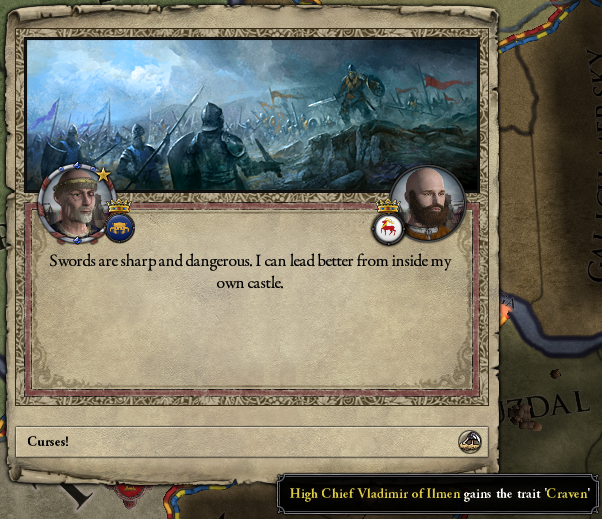   Humiliated one the field of battle yet again, Vladimir unconditionally surrenders to the Meryans. The high chiefdom is once again in deep debt thanks to a failed war.  Vladimir quietly returns to his life of studying alone, leaving the veche to once again run things, but they're unfortunately still the fools and idiots Rodislav II put into power. They throw the chiefdom into even more debt when they buy new ships for the Albani trade route, which hasn't exactly been the most profitable venture.  In 837, Vladimir is once again forced to make an appearance at a feast to ask his chiefs for help relieving the chiefdom's debt. Once again, Vladimir totally ruins the event, showing up poorly dressed and groomed, before giving a short speech that amounts to "give me your money, you idiots." Once again, no one is willing to part with a few gold to help their terrible high chief.   837 also brings some rather strange and alarming news: the Estonian Greeks have managed to convince one of Vladimir's distant cousins to embrace their religion and accept Christ into his heart. Vladimir invites Sviatoslav to Novgorod and tries to persuade him to give up the Greek religion. Sviatoslav politely declines and instead begins to vigorously debate Vladimir. Vladimir tries to remain calm and collected (after all Sviatoslav is but a young idiot), but as the debate last longer and longer, Vladimir can no longer control himself and finally calls his kinsman a blathering idiot who is easily swayed by false gods. Sviatoslav and Vladimir part on less than ideal terms.   In 838, an overworked, humiliated, and exhausted Vladimir falls infirm, completing a life full of continued humiliation and hardships. The veche once again picks up the slack, but this time with Vladimir's heir Briachislav at the helm. Young Briachislav has a keen military mind and uses the veche to help raise funds for a massive regimental training ground in Novgorod. Vladimir sits by impotently screaming about the costs of such a venture, but no one pays him much mind. In fact, hardly anyone notices when Vladimir slips into a coma in late April of 839 and in early May of the same year, Vladimir dies. There's a short and poorly attended funeral, before Briachislav is declared new high chief.    Vladimir died as he lived: completely humiliated and unloved by his people.  History remembers Vladimir as High Chief Vladimir Okayannyy, often translated as Vladimir the Accursed.
|
|
|
|
Freudian posted:Vladimir did nothing wrong. I strongly disagree.
|
|
|
|
Chapter 12: Vae Victis Briachislav is an ambitious man, known for his brawn, as well has his wrath. For the last two years, he's been working with the veche to build something for him to inherit, and the work has paid dividends in the form of cold, hard gold; he and the veche manage to pull Ilmen out of debt, with some extra to spare. Still Ilmen has not has a successful war in some years, and Briachislav aims to fix that as soon as possible. 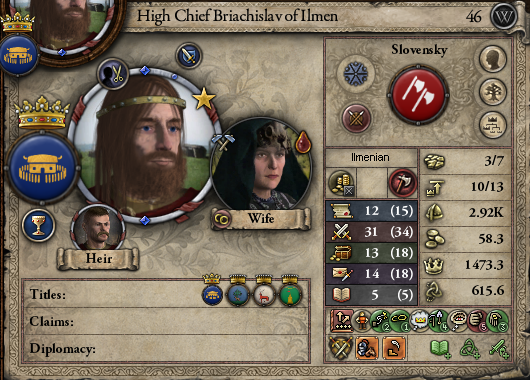  The first thing Briachislav does to kick off his reign is make it known that Perun will guide not only his sword, but the chiefdom; to show how serious he is, he offers up one of his eyes to the gods.  But Briachislav also knows that the majority of the ruling class favors Jarilo as their patron god and he has no wish to alienate the people who are going to manage the chiefdom while he's out winning wars, so he declares a month long festival celebrating Jarilo as the most important god in the Slavic pantheon. Its the first such festival to ever take place in Novgorod with official backing.  Of course, the Orthodox Ilmenians in Estonia refuse to attend a "heathen festival that denies the one true God and his son." Briachislav doesn't understand why anyone would refuse a free food and good company, but clearly the Greek gods are jealous and absolutely not interested in having a good time. 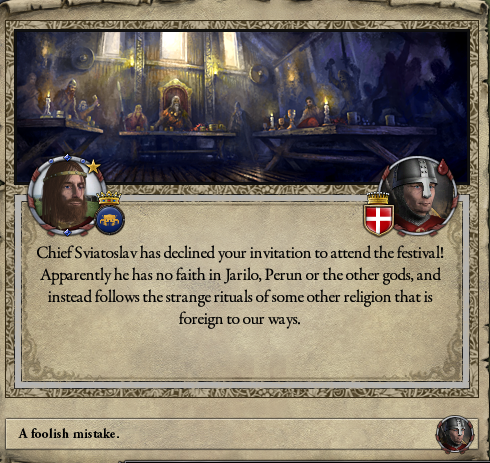 Still, the festivities go on and the people of Novgorod elect one of the assembled chiefs to represent Jarilo. After its all said and done, Briachislav's vassals leave Novgorod, confident in their new high chief's ability and, as an added bonus, no one can question Briachislav's piety to the Slavic faith.    Of course, not everyone is in love with their new ruler and Briachislav's quick to run down and stop any plots that would undermine his power; some would argue that this is borderline paranoia, but after the dark years under Vladimir, everyone is just happy to have a high chief that's on the ball and willing to actually do something about plots against him.   Besides bringing some much needed stability to Ilmen, Briachislav also brings some much needed legitimacy to the whole affair; while he was still just the heir apparent of the chiefdom, Briachislav had an iron crown and a ceremonial axe crafted as the regalia of the Ilmen throne, finally giving the high chief an air of much needed importance.  Towards the end of 839, Briachislav's wounds finally heal, leaving a nasty, but rather dashing, scar. All of this lends itself to his growing legend, and soon Novgorod experiences an influx of warriors, whom are quick to settle in and around the city.  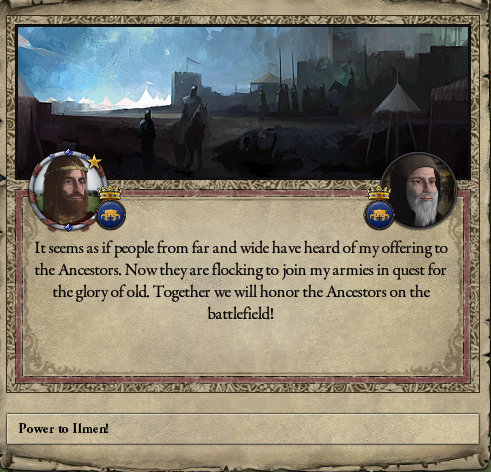 In 840, Briachislav calls for all true followers of Perun to assemble in Novgorod, to join in a glorious fight that will honor not only Perun, but also the ancestors of all Ilmenians. Nearly 1,000 men come to the capital, ready to avenge one of Ilmen's greatest set losses: Briachislav intends to break Merya and finally claim it for Ilmen. The veche, having worked with Briachislav for over a year during Vladimir's reign, is quite confident in his ability to wage war; those that aren't are easily bought, though.  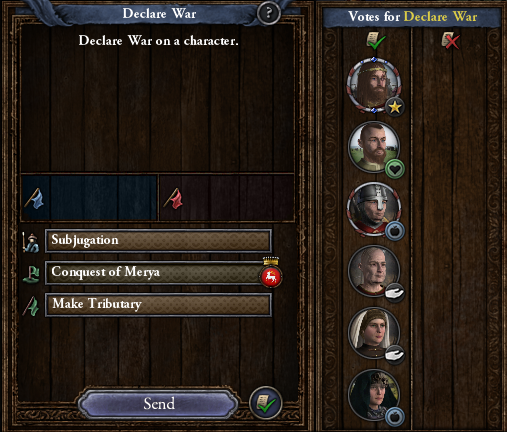 Yaroslavl falls to the Meryans, followed quickly by Uglich. High Chief Uchva, leader of the Meryans, starts sending peace offers, confident that this war will follow the last two; Briachislav sends the messenger's severed head back to Uchva as his reply.   Angered by what he sees as Ilmenian arrogance in the face of a superior fighting force, Uchva crosses the Volga into Torzhok to attack Briachislav's force, confident in getting an easy victory and ending the war. Briachislav provides him with no such victory, instead soundly defeating the Meryans, the first such victory in 20 years. 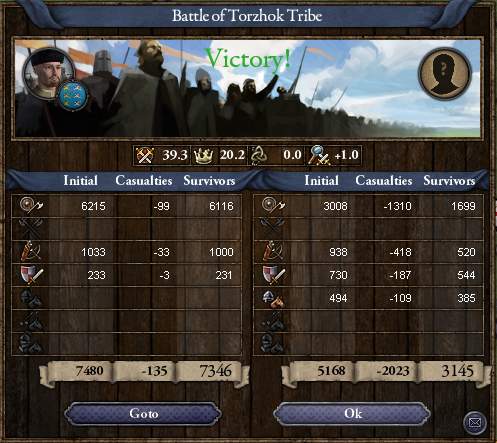 Briachislav follows up his victory at Torzhok with the liberation of Uglich and Yaroslavl, before crossing into Merya itself and once again defeating the Meryans on the battlefield. 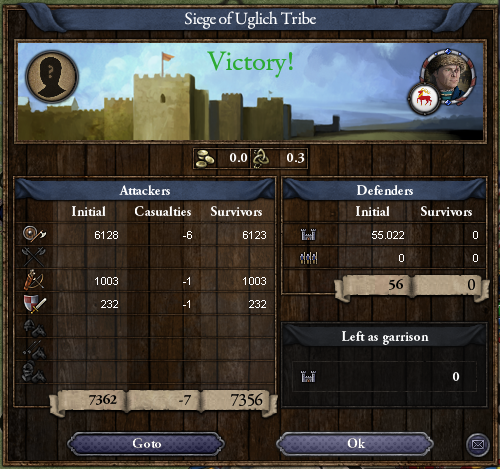   Uchva has not choice but to surrender and in 841 Merya is made part of Ilmen; as a final insult to his defeated enemies, Briachislav renames Merya to Rostov, intent on destroying any remnant of the tribe that humiliated Ilmen for the reign of two high chiefs. 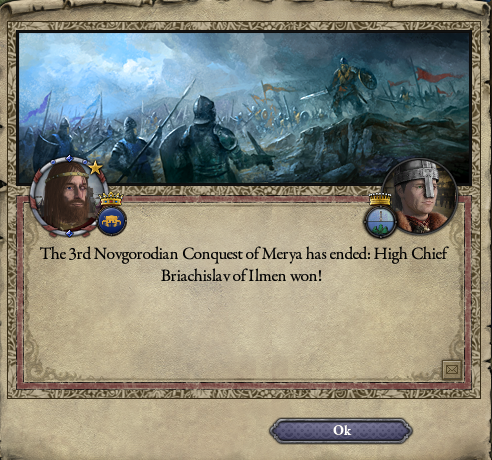  841 brings some startling news to Novgorod, as more and more Greeks start to seek passage on Ilmenian; apparently, there's no longer just one emperor, but four, all fighting for the throne in Constantinople, with the "rightful" emperor being forced to relocate to the city of Chersonesus. Briachislav, like his predecessors, directs them to settle in Estonia, which, besides displacing the rebellious Estonians, also has the added benefit of letting them be ruled by the Orthodox chief Sviatoslav.  Not too long after having the Greeks settle in Estonia, Sviatoslav hears that within their number is a great inventor and engineer. Perhaps hoping that by making the Orthodox Greeks useful to the chiefdom will lead to the spread of his religion, Sviatoslav introduces Briachislav to this man, promising that with a little funding, he will make a machine of war that will cow all that stand in Ilmen's way. Always eager for new and exciting ways to wage war, Briachislav gives Sviatoslav and the Greek his patronage.  In June of the same year, the experiments pay off, as the Greek, whom is named Andronikos, creates some truly amazing exploding arrows. While they are expensive to make and prone to fizzling out during heavy rains, they're still excellent for scaring enemy troops. Thoroughly impressed by his work, Briachislav makes Andronikos part of his court as one of his advisers.  Towards the end of 841, Briachislav receives some strange news; apparently the realm of the Avars has fallen to a mix of Slavic tribes. The leader of these tribes is a man by the name of Andrija, whom has bound the various Pannonian Slavs together under his rule. Only time will tell if this confederation will last. 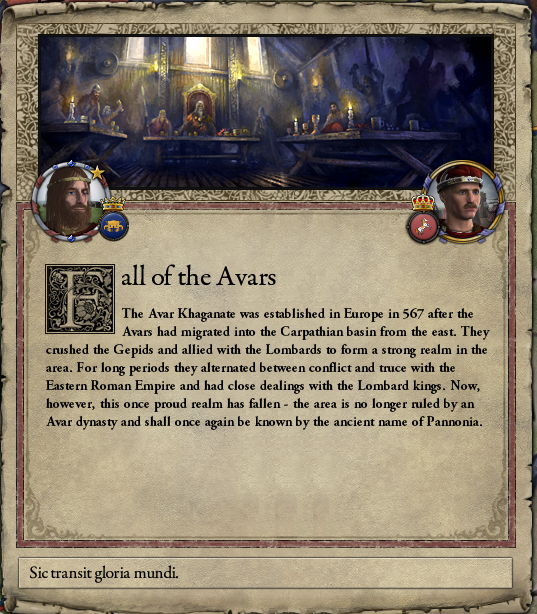 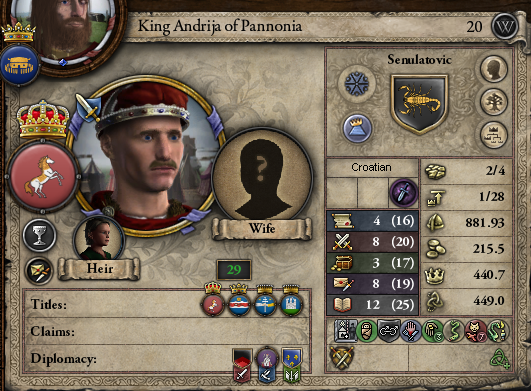 Briachislav has a grand vision for Ilmen, but to do it he needs more control over his chiefs. With a few strategic bribes to key members of the veche, as well as promises of more say in the running of the chiefdom, specifically more say in the judiciary. Briachislav is only too happy to grant them their requested powers, as it allows him to focus on the aggressive expansion of the chiefdom. 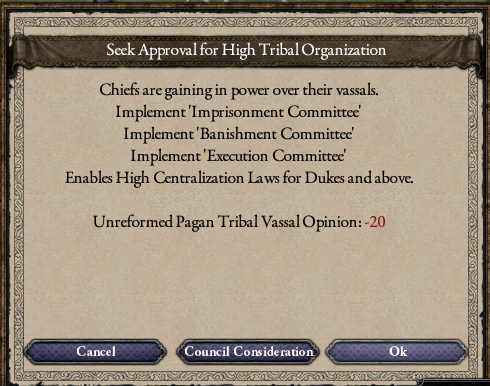  In July of 842, Briachislav finally starts to bring his grand vision into reality by declaring war on the Finns of Zaozerye, intent on claiming the city for himself.  It isn't until January of 843 that Briachislav makes his move; most of the Finns have returned home as winter set in and the force defending the city is mostly there for show, confident that no one would be insane enough to attack during the biting cold of January. Briachislav is insane enough, though, and he completely crushes the Finns. Zaozerye falls just a week later and soon the Finns are asking for peace. Zaozerye is now in Ilmenian hands.    Briachislav doesn't rest for long, and in June he gathers the veche again and asks them for their support in declaring war against the Lithuanians to the south of Ilmen for the city of Vilnius. They veche is only too happy to support Briachislav's adventures.   Of course, it wouldn't be a real war if the Estonians didn't use it to revolt against the Ilmenians. This time they're apparently mad about the influx of Greeks, who are slowly taking over Estonian farms, at the behest of Sviatoslav. 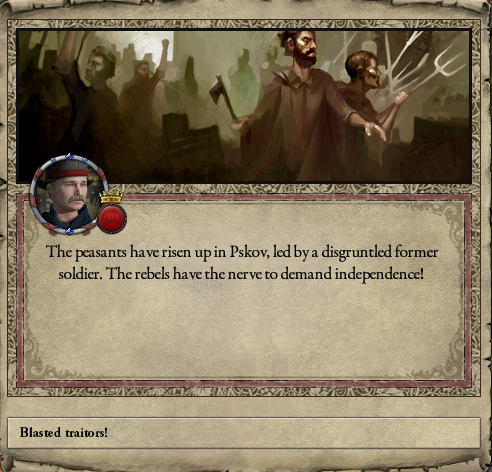 Briachislav quickly crushes the Estonians at Pskov and ends their foolish revolt before it can gain any sort of traction. He sends their leader, a man named Lible, back to Novgorod and asks the veche to deal with him as they see fit. They elect to execute him, much to no one's surprise. 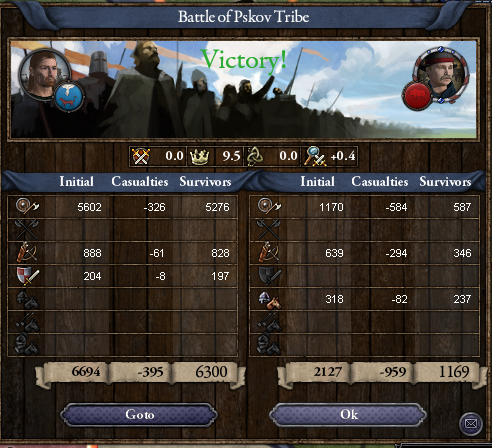 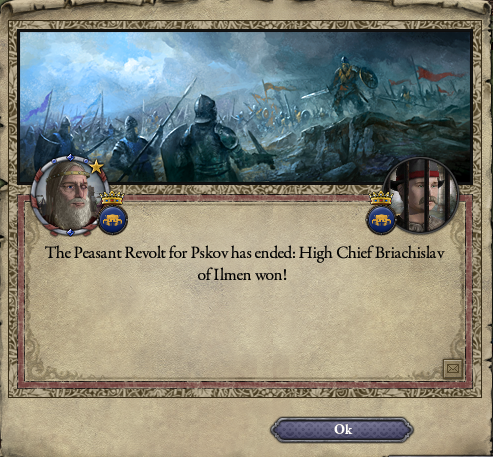  With the Estonian distraction out of the way, Briachislav turns his attention back to besting the Lithuanians. The Lithuanians have laid siege to Liivimaa and the Ilmenians engage them at the start of the new year, soundly defeating them. Briachislav drives his army hard to follow the Lithuanians as they retreat towards Vilnius; he refuses to give the enemy even a single day of rest. Thanks to this, the army the Ilmenians face at Vilnius is significantly smaller and more disorganized than what the one they fought at Liivimaa. About a month later, in March, Vilnius falls. 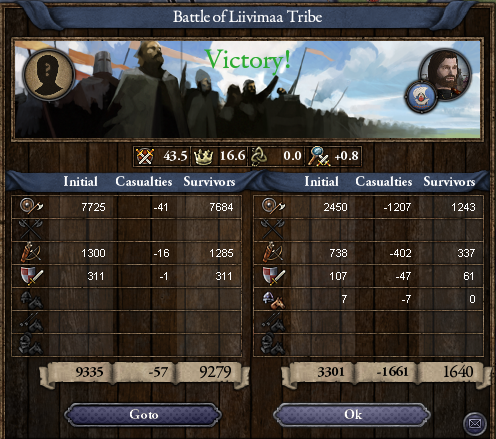 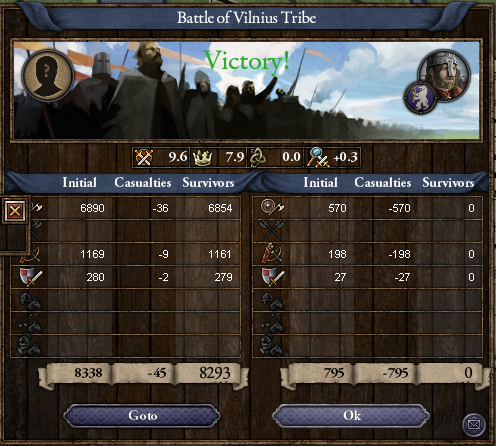 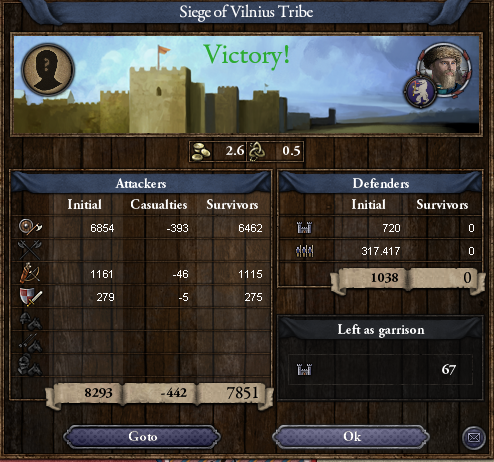 The Lithuanians manage to rally themselves at Riga, but Briachislav refuses to let them threaten him and his army. Briachislav once again proves himself to be a commander without peer, as he and his men easily kill four Lithuanians for every one Ilmenian that falls. After the Battle of Riga, the Lithuanians have no choice but to surrender.   Briachislav returns to Novgorod a hero of three wars, one right after the other. After the hard, dire years under Vladimir, Briachislav's ability and strength is refreshing, but it remains to be seen if he will be able to keep up this rapid pace of conquest.
|
|
|
|
Chapter 13: Unreasoning Briachislav's constant wars have drained Ilmen's coffers, so before he can continue his conquest, he must allow the chiefdom to recover. So, instead he prepares himself for war, practicing daily to better his understanding of personal combat, as well as tactics. During this time, Briachislav also spends time with Andronikos, whom tells him tales of the conquests of the Romans; Briachislav vows that his conquests will rival those of the emperors of old.   He also tries his hand at hunting, though it pales in comparison to actual combat. Still, he does find some common ground with a distant nephew and soon the two are discussing the upcoming wars Briachislav has planned. 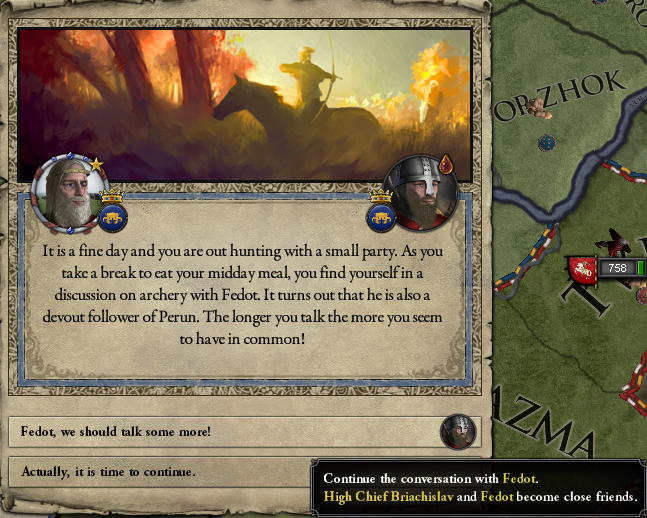 Meanwhile, the veche continues to administer the realm while Briachislav dreams of war and glory. Knowing their high chief's plans for the future, they allocate some funds to improve Novgorod's war camp. They also set aside some gold to keep a trade route out of the newly conquered Zaozerye going in an effort to win over the Finnish traders of the city.   The veche's actions have the unfortunate side effect of forcing Briachislav into postponing his dreams of conquest for another few years, but instead of becoming resentful of the veche, Briachislav instead moves to empower them to better collect taxes and carry out the day-to-day administration of Ilmen. Of course, the veche is only too happy to support him.  Briachislav's move to give more administrative power to the veche proves to be a wise decision, as the veche quickly begins to collect taxes in and around Novgorod; soon the chiefdom's coffers are once again swelling with gold. They invest part of this into once again improving Novgorod's war camp, but leave the rest for Briachislav.  He quickly puts it to good use and, in 848, declares war on the small Mordvin chiefdom of Mochkava, which controls a single, small city. Briachislav hopes to claim the city for Ilmen. By now Briachislav's legend is known far and wide and thousands of men flock to his banner. Despite the relative weakness of Mochkava, eleven thousand warriors have joined Briachislav, making it the largest band of warriors ever assembled by a high chief. Truly, Briachislav is uniquely blessed by Perun.  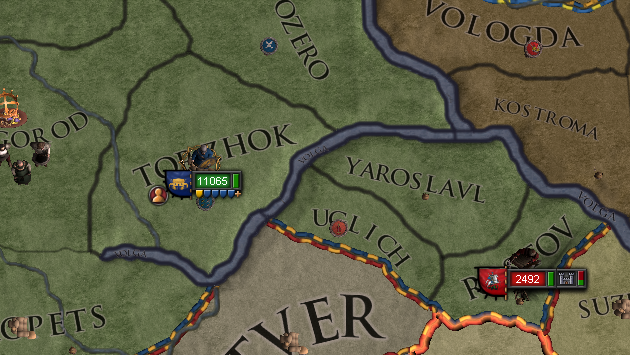 The word of the Ilmenian host is enough to chase the Mordvins out of Rostov, but Briachislav refuses to let them get off so easily; instead, he peruses them into foreign territory, much to the chagrin of the Mordvin chief who rules the area. Once they're pinned down, the Mordvins melt before the Ilmenians. Briachislav then swings back towards Mochkava and lays the city to siege. With his holdings lost, the Mordvin chief has no choice but to surrender to Briachislav. As with Rostov, Briachislav strikes the name of the Mordvin city and renames it Pereyaslavl Zalessky. 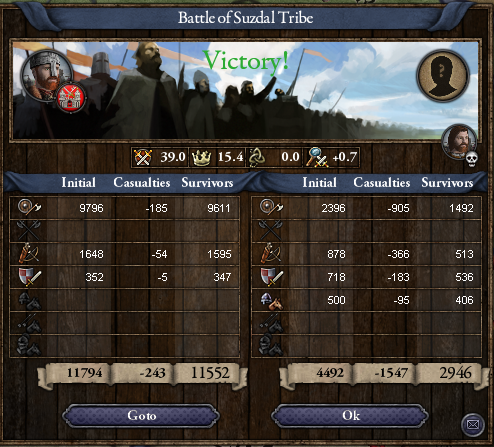   Briachislav's skills in war have spread as far as the steppes and one of the nomadic khans is soon asking for a betrothal between one of Briachislav's daughters and the youngest of the khan's sons. Briachislav can see the advantages of having a friendly horse lord on his side, so he agrees.  Briachislav isn't one to rest on his laurels (or rest at all, really) and it only takes a year before he's ready to go to war again. This time, his target is set squarely on Zemgale. The veche has no choice but to support Briachislav, as doing anything else would only turn the public against them. So, in 849, war is declared once again against the Lithuanians.  Zemgale quickly falls, with its defenders simply surrendering after they learn that Briachislav is the one leading the Ilmenians. The same is true when Briachislav's army arrives at Riga; its quickly becoming apparent that the legend surrounding Briachislav is almost as useful a tool as Briaschislav's ability to wage war.   The Ilmenians finally encounter a small Lithuanian army at Kurzeme, barely one hundred men strong. The survivors flee towards Riga, but Briachislav chases them down and, after an extremely one sided fight, not a single Lithuanian remains alive. Soon, word spreads about Briachislav's brutality and the Lithuanians begin calling him " Beprotikas," which roughly translates to unreasoning. Briachislav is only too happy to own the nickname and even starts having his men use it.  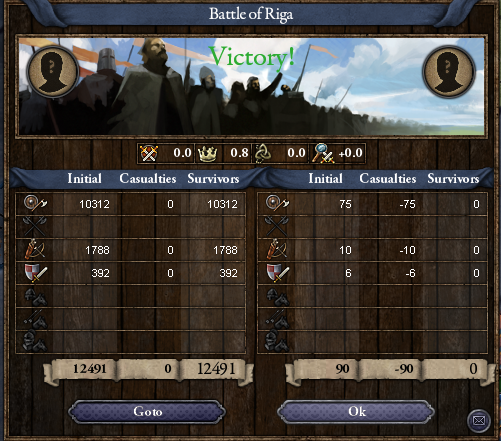 Briachislav is sure that the Lithuanians will accept peace after the the amount of damage he's done to their armies and cities, but they stubbornly refuse to deal with him. So, Briachislav continues to to wage unceasing war on them. The city of Trakai falls in February of 850 and Briachislav finally manages to engage a significant Lithunanian force Galindia. The Ilmenians, predictably, win and the Lithuanians retreat to Marienburg, where they link up with a few other tribal armies and prepare to make their last stand against the Ilmenians. It proves to be absolutely futile, as the Lithuanians lose half their number, while Briachislav only loses a handful.    Peace is finally made in June of 850, and Zemgale is made part of the growing Ilmenian chiefdom. But Briachislav isn't satisfied with just the city, he also forces the Lithuanians to hand him Riga, which they consider one of the holiest sites of their religion. Briachislav then orders his men to tear down any Romuva holy symbols in Riga's temple and replaces them with proper Slavic symbols; the message is clear: if you get in Briachislav's glorious vision, he will do everything in his power to destroy your false gods. 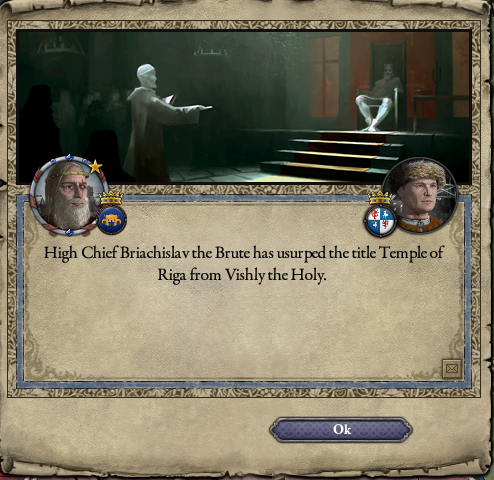 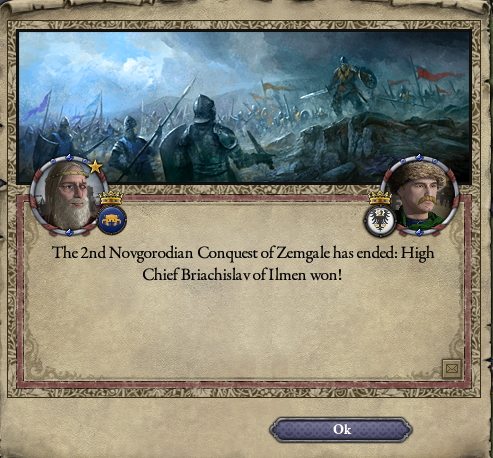 With his enemies cowed before him, Briachislav returns once again to Novgorod with a brand new reputation of ferocity in battle. It finally looks as though Ilmen is rising in the world, and its all thanks to Briachislav's guidance and strength.
|
|
|
|
State of the World: 850 The Ilmen of High Chief Briachislav is much different than the one of Rodislav I Durak; its significantly larger, but also much more prosperous, thanks to its trade with not only the Byzantine Empire, but also with the far off realm of Alban. Ilmen is quickly becoming a regional power, though its ability to continue expanding and prospering is greatly hindered by its tribal government and its only thanks to the tireless efforts of the various Ilmenian veches, led by the veche of Novgorod, that things have held together so well. 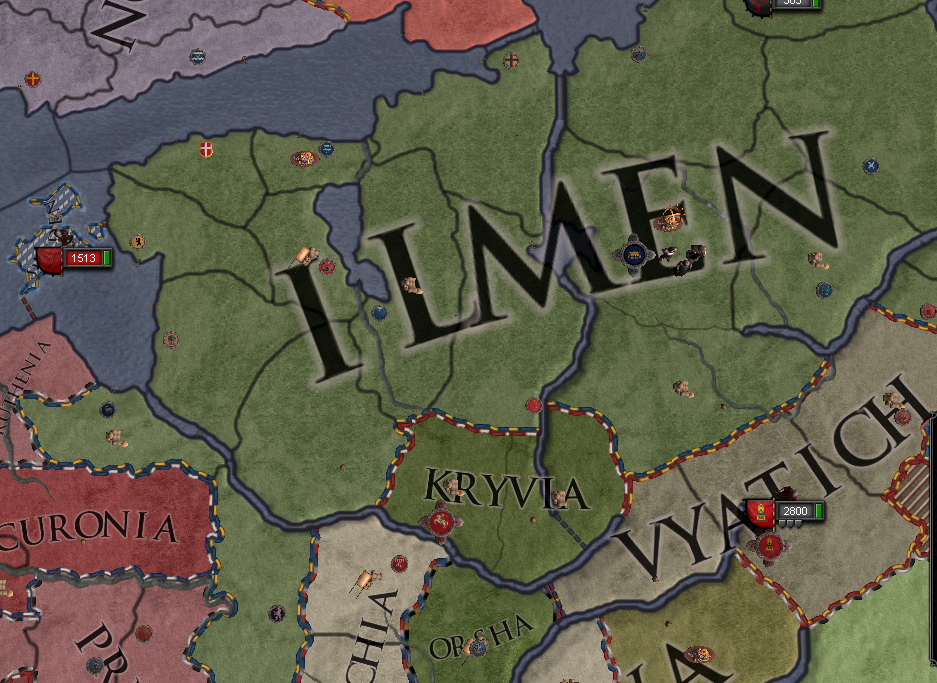 To the south, the Byzantine Empire has mostly recovered from its constant civil wars, though they still have the occasional rebel prince and the emperor hasn't moved his court back to Constantinople out of fear of the various noble plots to take his throne. The recent instability of the Byzantine throne has also allowed Muslim adventurers to seize some Byzantine land, in the form of the Subaid Emirate. How long the Greeks will tolerate the emirate still remains to be seen, but until then Ilmenian traders have used it to their advantage, bringing more and more Arabic goods to Novgorod. 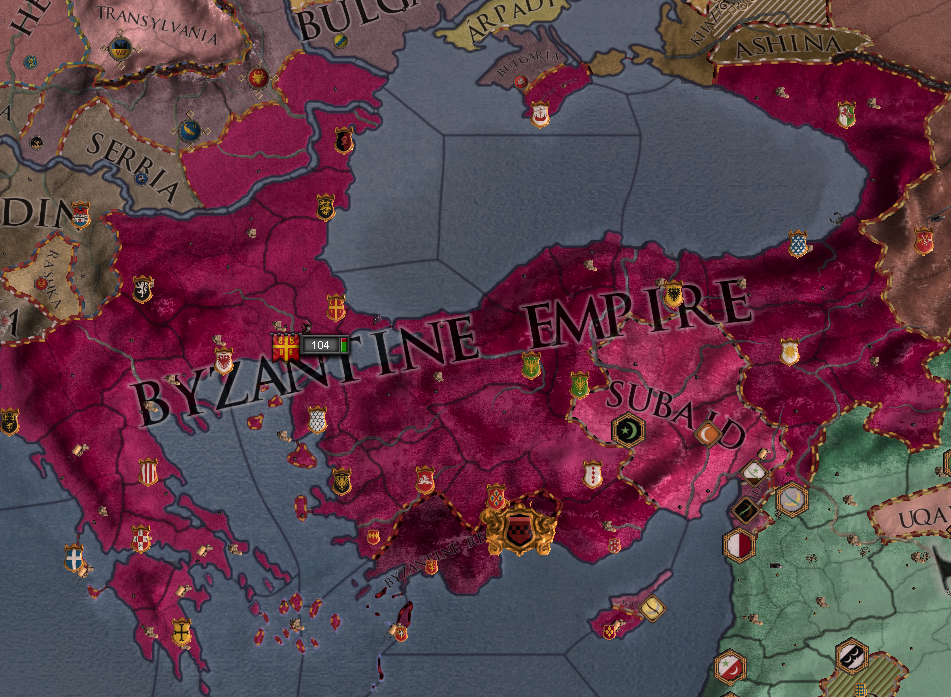 To the west, Francia holds claim to the throne of the Western Empire. The Frankish emperors have used their vast armies and wealth to slowly expand into Hispania, kicking out the Muslim emirates and sultans that have made residence there. Francia's strength has also driven the Norse away from their shores, making them focus on Alban; true to their self-proclaimed Roman roots, Francia has used this as a means to slowly expand their influence over the island, offering the Albani kings some protection against the viscous Norsemen.  Lomard Italy is deeply divided, as civil war tears the kingdom apart. The northern rebels are supported by Francia, who seek to install king more to their liking, with the goal of reclaiming it for the imperial throne. The southern loyalists are receiving support from the Greeks in Sicily, who have no interest in allowing the Franks any sort of influence in the affairs of Italy. Unfortunately, there's only so much the Greeks can do without the backing of their own emperor. 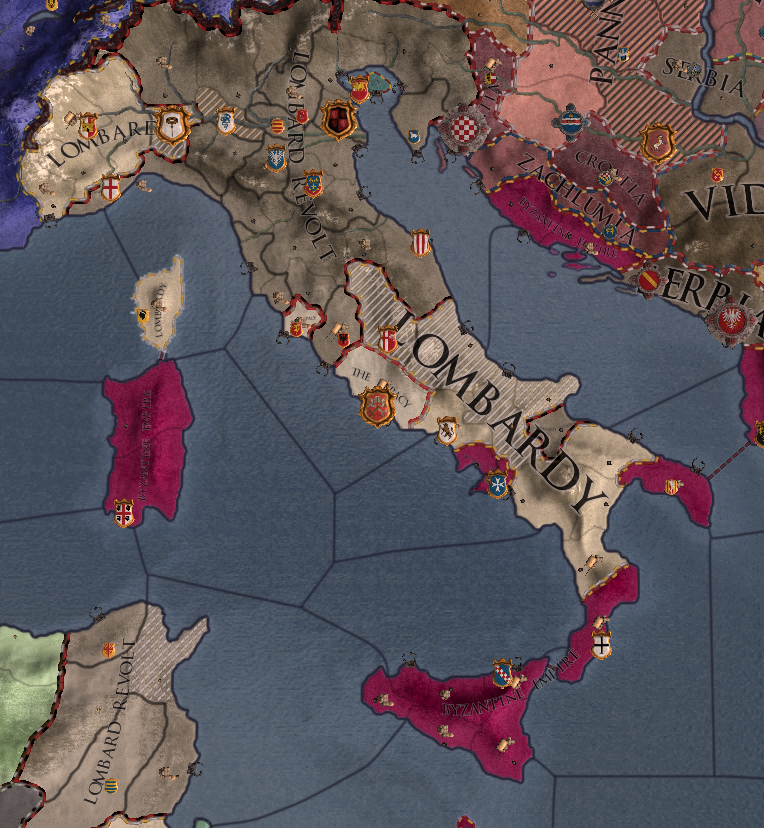 Central Europe is a mess of tribes, most of which are Slavic. Poland, Bohemia, and Pomerania hold the most power in the region and the three are constantly at odds, as they try to assert themselves over the others. The Pannonian tribes are still united, though the Avars are slowly rebuilding their power base in Transylvania and have start to support Avar adventurers that seek to reclaim Pannonia for their people.  Finally, the steppes continue to be dominated by Tengri nomads but the Ilmenians have a tenuous non-aggression pact with the Ashina, thanks to Briachislav's marriage into the ruling khan's dynasty. Should Ilmen continue to expand, it'll eventually bump into these fierce horse lords. 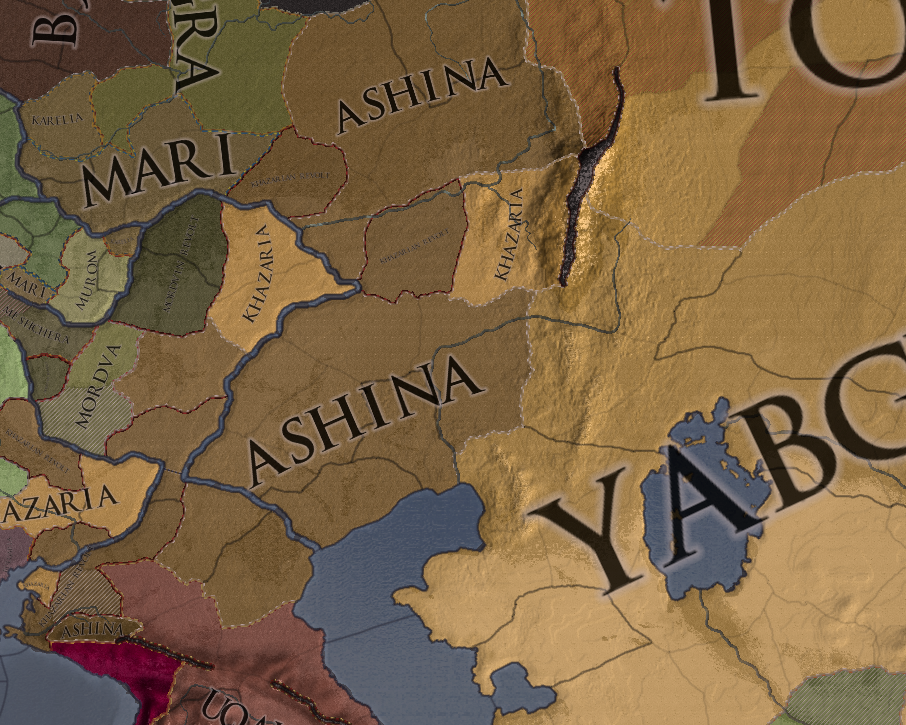 Religious Map (Slavic holy sites highlighted)  Political Map 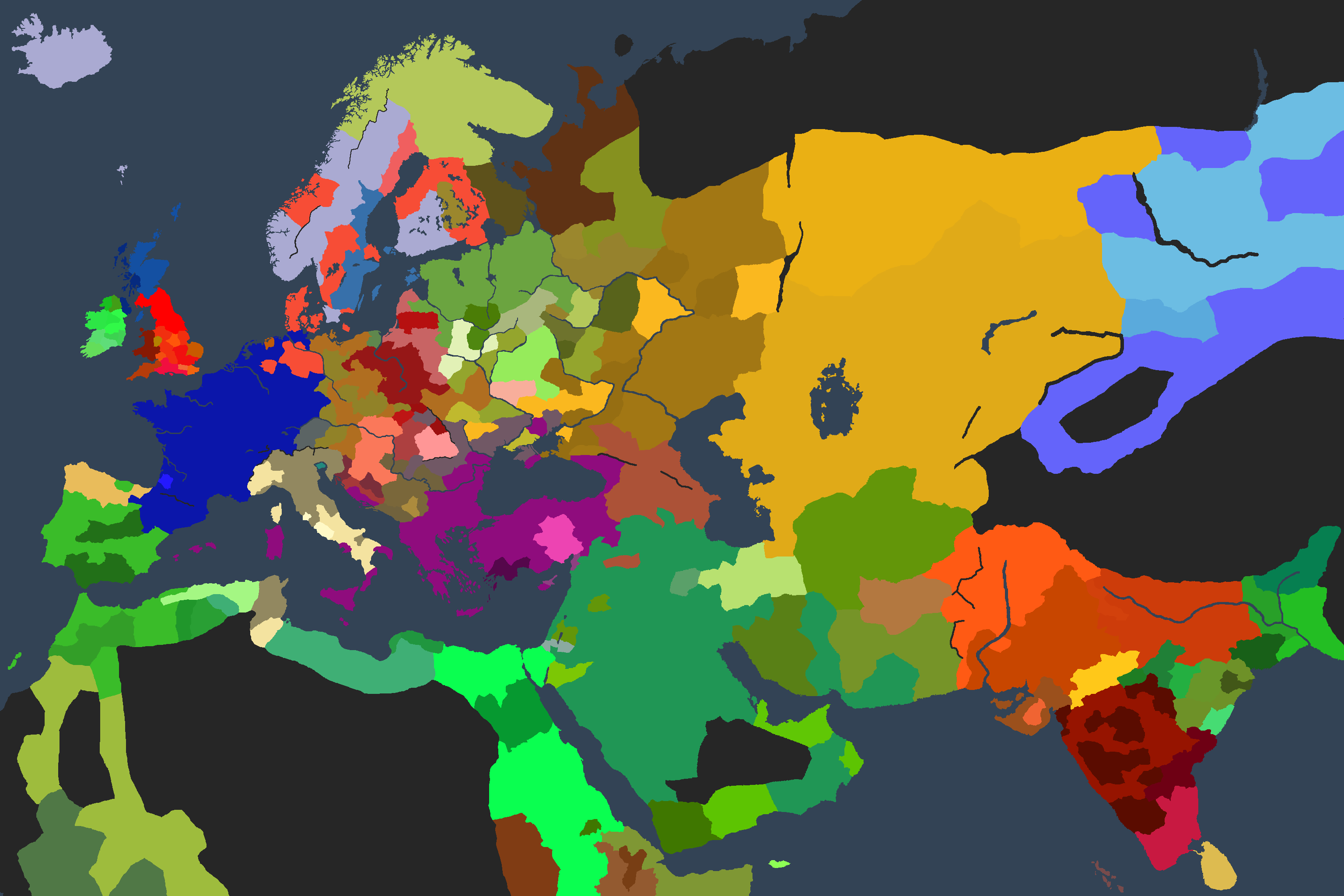
|
|
|
|
Chapter 14: Legend Ilmen is again in debt, thanks to Briachislav's wars, much to the consternation of the veche; Briachislav attempts to appease them by selling the titles of Vilnius, Zemgale, and Riga to suitable members of the nobility. Most of the veche goes along with it, though there are a few dissenters. It is only later that the veche realizes Briachislav's picks are none other than two of his sons, but its too late for them to change their minds.   As the new year dawns, the chiefdom is still completely broke and, with no war on the horizon, Briachislav decides to dedicate himself to learning Greek and Albani from the various immigrants and traders that make Novgorod their home.  Without war to entertain him, Briachislav also indulges in his paranoia; he begins to see plots and intrigue in everything, including the announcement that one of his concubines is pregnant; he is absolutely sure that he was away fighting the Lithuanians around the time she would've become pregnant. At first he has a courtier follow her around, trying to find any evidence of her infidelity to Briachislav. When the courtier finds nothing to suggest anything suspicious, Briachislav confronts the woman himself, after which he is finally assured of her loyalty to him. Of course, this whole event ends up costing Ilmen a fair bit of gold, mostly in hush money to cover up the whole embarrassing affair. 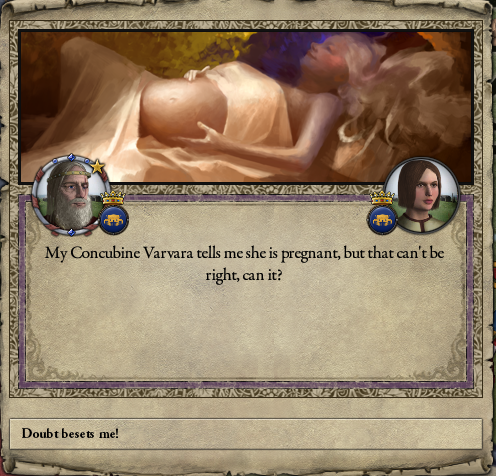 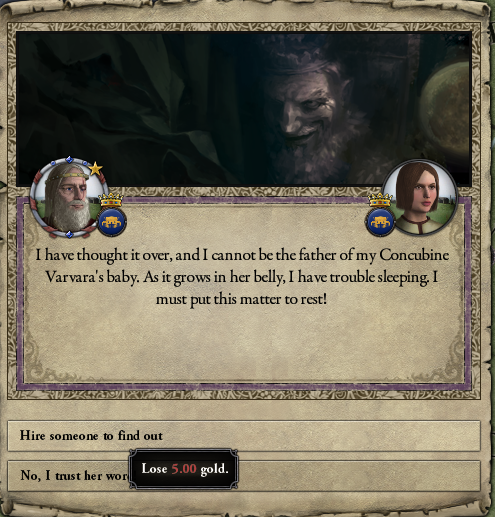  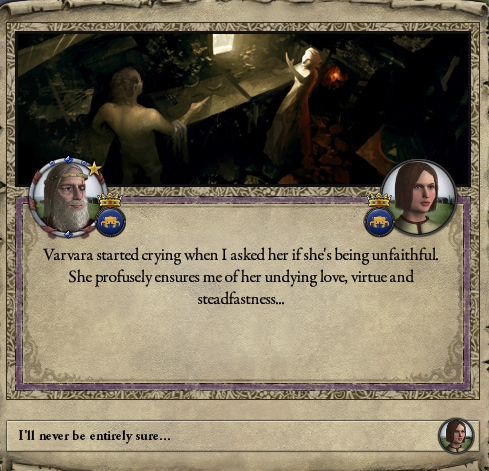 It appears that whole thing is going to happen again later that year, as Briachislav once again accuses one of his concubines of being unfaithful. Thankfully, the veche manages to collect enough taxes to fund another war, completely distracting Briachislav from his paranoia. This time Briachislav sets his sights on a brand new target: the Prussians of Zemaiteje.  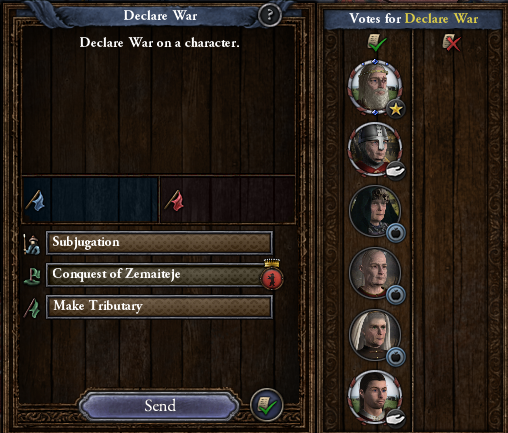 The veche also funnels some of the taxes they've collected into building a practice range in Novgorod, promising Briachislav that in the near future, the city's levies will finally field actual archers.  The Ilmenians and Prussians finally clash at Latgale, and the superiority of arms and training quickly wins the day for Briachislav. Meanwhile, in Novgorod the veche holds a quiet vote to raise the taxes collected from temples and churches in an attempt to find another source of funding for the chiefdom.   The Prussians next move to take Vilnius, but Briachislav out maneuvers them and manages to kill half their number, resulting in them disorderly fleeing the field, fleeing back towards the Prussian capital of Memel. Without anyone to oppose him, Briachislav lays siege to Zemaiteje, finally taking it in February 852.   Looking to put an end to the war, Briachislav moves to meet the Prussians at Memel. Not wanting to risk damaging their greatest city, the Prussians instead meet the Ilmenians at Scalovia. Once again, the Ilmenians swiftly defeat them and not too long afterwards peace is made in March of 852. Briachislav renames Zemaiteje to Jemotskaia Zemlia, though it is typically shortened to Zemlia.  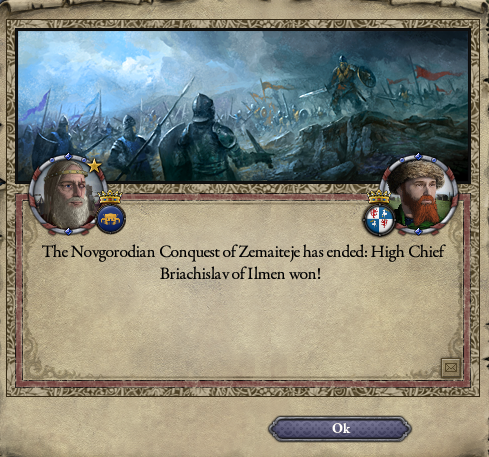 With the war over and the chiefdom once again in debt, Briachislav returns to studying languages, until he finally masters the basics of both Greek and Albani. His new found fluency comes just in time, as the heir to the Ashina khanate finally comes of age; the Khazars of Ashina also have extensive contact with the Byzantine Empire, mostly in the form of mercenary work during the Year of Four Emperors, and Baghatur speaks enough Greek that Verkhoslava can understand him. The marriage is a major boost to Ilmen's prestige and power, cementing the chiefdom's place as a rising regional power. 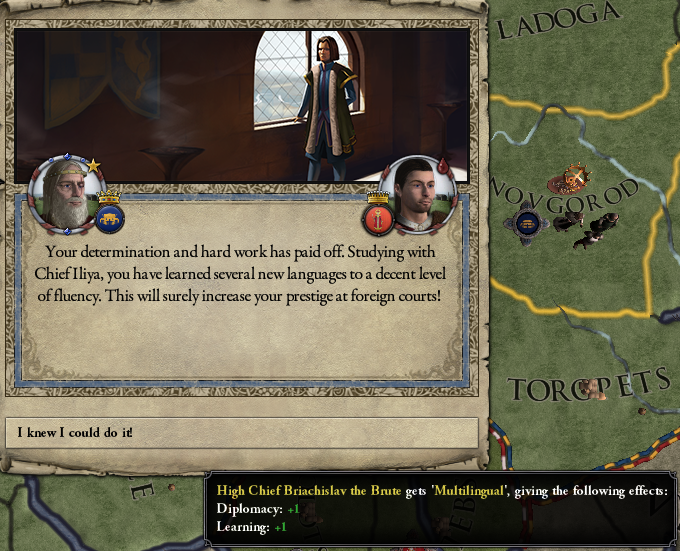  Briachislav turns this new clout into convincing the veche to support his move to name one of his relatives as chief of Zemlia, as well as getting the them to help expand Novgorod's practice range by collecting some extra taxes from the temples of Ilmen.   In August of 853, the chiefdom is back in the black, which means its time for one of Briachislav's wars; this time against the Prussians of Kurzeme. Briachislav persuades the veche to back him by promising new trade ships and ports in Kurzeme for several of the veche's most prominent trading families.   Unlike previous wars, the Prussians of Kurzeme show no fear or concern for Briachislav's reputation of ferocity and quickly take Zemlia; Briachislav decides to teach them a lesson about showing proper respect and he engages their army at Riga, killing the majority of the Prussians that join in the battle. 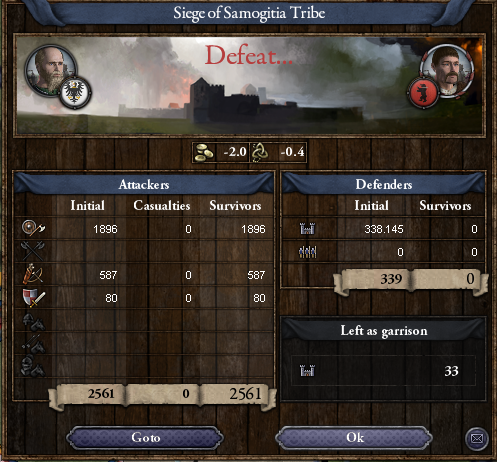  With the Prussians bested, Briachislav begins taking Prussian cities with little to no resistance; Kurzeme, Sambia, and Romowe fall to Briachislav's armies and soon the Prussians start looking for peace. In June of 854, Kurzeme is officially made part of Ilmen.     Briachislav also makes good on his promise to the veche; Kurzeme is handed off to one of the richer merchant families, as well as given an exemption from paying taxes for a period of five years in order to help the city build up its ports and fleet of merchant ships.  Briachislav and the veche also spend some time updating the laws created by Zbignev, with the idea of further codifying the powers of the high chief and the veches. After some months debate over which powers will be given to the high chief and which to the veches of Ilmen, the updates to Zbignev's laws are finally passed in December of 854.   Briachislav returns to studying languages and hunting in his spare time, but nearly a year later he passes away peacefully in his sleep, his final wars unwaged. His death is mourned by everyone in Novgorod and Ilmen and a week of mourning and sorrow is held in his honor. Every soul in the chiefdom knows that a great man has passed into the afterlife, where he will be eternally honored by Perun as one of his chosen.  History remembers Briachislav as High Chief Briachislav Bezumnyy, often translated as Briachislav the Unreasonable.
|
|
|
|
Chapter 15: The Old Chief When Rogvolod is already an old man when he inherits the chiefdom from his brother Briachislav. Unlike Briachislav, who's talents were more inclined for war, Rogvolod is more suited for rulership. He's also much more temperate and calm than his brother, but there are persistent rumors that he enjoys the company of other men in the ways a man would normally not.  Rogvolod's first act as high chief is to declare war against his nephew Fedot, the chief of Zemgale and Zaozerye; when Briachislav died, several of chiefs on the peripheral of Ilmen have declared themselves independent. Rogvolod is determined to return them to the fold, though the veche is divided on their support for such a war, as many of them are relatives of Fedot.  Rogvolod doesn't inspire as much confidence as his brother did and, as such, the men that are willing to fight for him are far fewer in number. Still, he is able to summon a fair host and, despite his advanced age, he chooses to lead them from the front. Rogvolod finally engages his nephew at Liivimaa and the two find themselves facing each other in personal combat; Rogvolod's age starts to show and he is gravely injured when Fedot badly slashes his face. Rogvolod attempts to flee, but falls off his horse, getting trampled in the process; this completely ruins his face. Still, the Ilmenian army became a finely tuned machine under Briachislav and even seeing their leader maimed, they do not break and instead win the day.    Riga and Zemgale fall to Rogvolod and soon Fedot is asking for peace. Rogvolod takes pity on his nephew and only takes Zaozerye from him, though the threat of the Ilmenian army coming back still hangs over Fedot's head.   Rogvolod's health begins to recover after the war against Fedot, but both he and the veche decide that the administration of Zaozerye would be best left to someone with more youth; the majority of the veche picks Chief Vladimir of Ladoga, a kinsman of Rogvolod, to give Zaozerye to.   In September of 856, the island of Saaremaa, long conquered by the Norse, manages to overthrow the foreign chief ruling them and elects an Estonian peasant to rule over them. Rogvolod and the veche see the strategic importance of Saaremaa and aren't too eager to leave it independent for long, lest the Norse return to conquer it, so they declare war on the peasant chiefdom.  The Ilmenians engage the Estonians at Kalevan and soundly defeat them. The Estonians cross back into Saaremaa, hoping that the Ilmenians won't have the ability to follow them over the water; they turn out to be wrong and the two armies fight outside of the city of Hiiumaa, where the Estonians are defeated for good. Saaremaa falls not too long after, bringing the island under the control of Ilmen.    Saaremaa is annexed in spring of 857 and the temple at the city of Hiiumaa is turned into a proper Slavic one, just as Riga was during Briachislav's reign, before the whole island is given over to Chief Volodar of Läänemaa.   Rogvolod is now old and injured and instead of war, he decides to take up reading and writing poetry; unfortunately he doesn't seem to have a talent for it, so instead he takes to falconry, which he finds much more enjoyable. 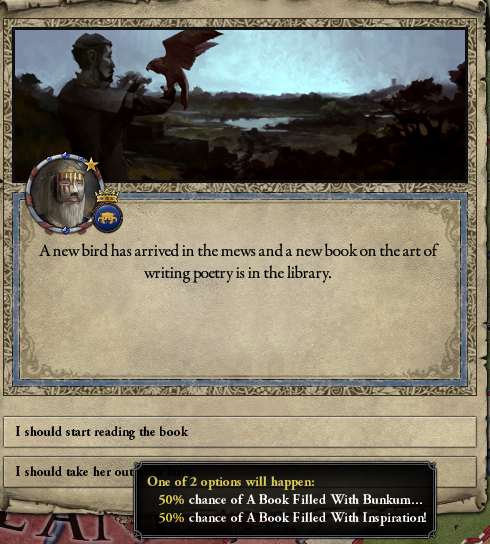  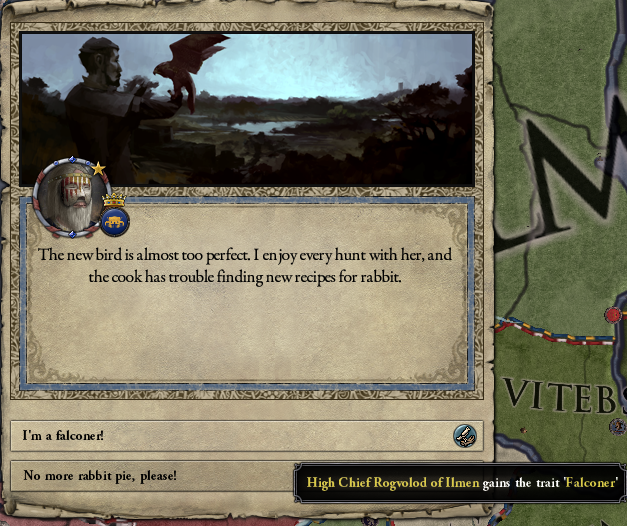 He also overseas the biggest expansion of Novgorod's harbor in the city's history, making it something to be envied by all Ilmen's neighbors.  The expansion of Novgorod's harbor would be Rogvolod's last act as high chief, as he passes away in April of 858 at the age of 61. While his reign was incredibly short, the three relatively peaceful years he did rule afforded the chiefdom a moment to catch its breath and recover following Briachislav's aggressive wars.  History remembers Rogvolod as High Chief Rogvolod Staryy, often translated as Rogvolod the Old.
|
|
|
|
Chapter 16: Reformation Ruslan is elected chief in the wake of Rovgolod's death and he takes the throne in May of 858. While he's neither as gifted as Rogvolod at administration or Briachislav in matters of war, he's still fairly decent at both, as well as quick to make friends and sway even his worst enemies to his point of view. His way with words, combined with his military prowess and better than average administration skill, allows the chiefdom to hold together in the wake of Rogvolod's death.   Ruslan prays to the ancestors, hoping that they will give him the ability to make friends easily, allowing him to keep the Ilmen from crumbling under the massive administration strain its currently facing; He chooses to send one of Briachislav's concubines to the afterlife.   He also dedicates himself to Jarilo, as most chiefs before him have; Ruslan has no intention of rocking the boat and angering the people who do most the day-to-day running of the realm.  Ruslan's prayers for companionship are answered in a strange way: a black cat begins to follow him around. Though he's relatively indifferent towards the concept of owning a pet, Ruslan's trusting and gregarious nature eventually wins out and he fully adopts the cat, naming her Dennitsa after the goddess of the morning star.  Ruslan continues to rule peacefully, intent on winning the hearts of his people; when a noble thankful for his advice gives him a small amount of gold as a gift, Ruslan immediately gives it to the poor. The people of Novgorod begin to speak of Ruslan's charity and gentle nature.  Ruslan's diplomatic nature pays off when, at the start of the new year, he proposes a new law that would allow him to strip titles from heathens who refuse to recognize the Slavic gods. While he has no intention of actually using the law (the Orthodox chiefs of Estonia have become entrenched and rich due to their access to the Baltic), he does plan to use it as a method for negotiating the loyalty of the Estonian chiefs.   As spring finally dawns in April, Ruslan continues the work started by Rogvolod and declares war on Fedot of Zemgale with the intention of regaining the city for Ilmen. The veche initially pushes back against Ruslan, as many of their number include Fedot's kinsmen, but after some honeyed words and gold, they decide their familial loyalty to Fedot aren't as strong as their ties to Ruslan.  Zemgale itself falls without much response from Fedot and Ruslan prepares to take Riga when a messenger from the chiefdom of Poland arrives, with a massive entourage.  The message, needless to say, is rather shocking to Ruslan.  The man, through one of his two Greek translators, explains that he is High Priest Karol, the head of the Reformed Slavic Church. King Prendota has conquered the Bohemians and, with the aid of two Greek brothers, he has codified the religion of the Slavs and created an official language for this new Slavic church. He also explains that while all the Slavic gods are honored, King Prendota has proclaimed that Perun is to be honored above all the others, which slightly conflicts with the Ilmenian strain of the religion. Karol then demands to know if the Ruslan and the Ilmenians will adopt this new Slavic faith, or if they will deny progress and the will of King Prendota.   If what Karol claims is true, then Poland has become the undisputed power of the Slavic world and it wouldn't do to carelessly ignore his claims as the rantings of a madman.  The war against Fedot is put on hold and Ruslan rushes back to Novgorod, where he convenes an emergency session of the veche, to discuss these developments. Ruslan has asked the veche for their guidance, but there are many voices and opinions. Which one held the day though? Please pick only one! Option A: The Sons of Perun The veche advised that Ruslan accept Prendota's reformed Slavic faith, which blends the old ways with newer influences, taken from the religion of the Greeks. The only points of contention is the placement of Perun over all the other gods and goddesses, as the Ilmenian people have always honored Jarilo above all, as well as the fact that the High Priest of the faith is effectively a Polish puppet. (Effect: Ilmen will adopt the Reformed Slavic faith, which will have a strong Polish influence. While its possible that Ilmen can eventually take control of the church from the Polish, if the Polish remain in control of the church by the time we hit EU4, then there might be some... difficulties.) Option B: Greek Gifts The Greeks of Estonia have greatly influenced the Ilmenians there, enough so that they have a significant voice in the Novgorod veche. The veche also had no interest in allowing the Polish king to influence Ilmenian affairs; the Orthodox faith promises the least amount of outside influence, as the Greeks are incredibly distant and the patriarch of Constantinople holds little sway outside of the Byzantine Empire. (Effect: Ilmen will convert to the Orthodox faith, completely cutting ties with the Slavic world. The Orthodox faith is also the religion of the Byzantine Empire and, if they can ever get their poo poo together, could provide a useful and powerful ally. That's an extremely big if, though, and they most likely won't be viable for a number of years.) Option C: The Latin Faith The Albani priests brought back by Rodislav II following his voyage to the distant island have been slowly converting Ilmenian peasants to their strain of Christianity and in recent years they have been able to convert the chief of Torzhok, giving them a small, but vocal voice in the veche. The veche refused to choose between the Polish king and the Greek emperor and instead decided to throw their lot in with the Franks and the Pope of Rome. (Effect: The Pope and Francia are distant enough that accepting Catholicism would mean Ilmen would only have to pay lip service to the faith, though it might be a useful tool should we wish to join up with Francia and crush Poland in between us. This option also has similar problems to the Orthodox one, as it won't be something we can realistically do for a number of years, during which Poland might become so strong that not even Francia can stop them.) Option D: Islam is the Light! The traders of Novgorod have had a small amount of contact with the Muslims of the Middle East, though such contact has grown in recent years thanks to the Subaid Emirate in Anatolia and, even though it has recently been reconquered by the Byzantines, their influence lives on in some of the merchants that regularly traded with them: several of them have accepted the faith and are using their wealth to persuade others to join them. (Effect: Ilem will become Sunni Muslims. Unlike the first three options, there is no strong Islamic ally nearby who would realistically help Ilmen should the need arise and pretty much everyone would hate us. Oh also, I'd probably throw in some province modifiers to simulate rebellion against the outlawing of alcohol; according to Russian legend, the banning of alcohol is a major reason why Islam was never accepted by the various Russian rulers, so I figure increased revolt rate for a few years would simulate this phenomenon pretty well. The upside is that Ilmen would have the most control over their strain of Islam, as the caliph and other Muslims are extremely distant.) Option E: Next Year in Israel The Jewish people have always had a way to the strangest of places and with Ilmen's limited contact of with the Muslim world, a few have found their way to Novgorod. While still an extreme minority, the Jews of Novgorod still have a small voice in the veche. It is completely possible that none of the other choices would satisfy the assembled members of the veche and that they would instead land upon picking Judaism as the official faith of the chiefdom. (Effect: To be honest, this choice will not have a whole lot of effect, besides making Ruslan Jewish. Ruslan doesn't have the the diplomacy to convert his vassals and Judaism's moral authority is so low that no provinces will convert. Vote for this if you don't want to vote on any of the other choices and want a civil war to decide which faith we go with. To be absolutely clear, this is the option you pick if you want to leave our religion up to complete random chance!) While the future faith of the chiefdom was the main reason for the veche to be assembled, talks naturally turned towards the future administration of the chiefdom. While nothing was set in stone, these discussions would shape the future of Ilmen. Please only pick one! Option 1: Vox Populi The veche of Novgorod has slowly grown in power, usually at the expense of the high chief, but not always. The prevailing sentiment is this shouldn't be the case: the veche and the high chief should work closer together, with the high chief being elected by the veche from its ranks. Naturally, the Slovensky family has many members in the veche, so its likely that several of these elected high chiefs would be from their number, but its no guarantee that every single elected chief will be from their family. This option is also heavily favored by the merchants of Novgorod. (Effect: I'll be angling for the merchant republic government, though I won't adopt it immediately, since doing so would be suicide, considering all the pagans we'll be surrounded by. When I do adopt it, I'll make sure to pick every single council decision to empower the council and I'll never go against the council's wishes until they've been suitably bribed or coerced. I'll also never allow myself to be elected ruler twice in a row, unless its completely unavoidable.) Option 2: Help, Help! I'm Being Oppressed! The veche of Novgorod has slowly grown in power, usually at the expense of the high chief, inevitably leading to a power struggle between the two. At the best of times, this leads to a weak puppet chief, while at the worst it leads to constant wars and reprisals. The veche has decided that this cannot be allowed, even if it means a curtailing of their own power and the empowering of the high chief as king, styled after Prendota. (Effect: I'll be working my way towards going fully feudal monarchy. This means that I won't necessarily empower the council, though its possible with the right high chief, and that I won't always follow what they want. I'll also be angling to pick up primogeniture for my succession law.) When you vote, please record it as a letter followed by a number! For example, if you want to go with Reformed Slavic and a feudal monarchy, please write A2! It'll be easier for me to count that way! Finally, the vote will last for a total of three days, ending on Saturday, probably around noon my time.
|
|
|
|
Just as a note, I did not do anything to encourage the AI to reform the Slavic faith and I was completely surprised when it happened; the AI absolutely did this whole thing by themselves and because of this, I've had to stop playing the game for about three weeks while I caught up on updates. To that end, I've sort of been rushing these updates so that I could hold this vote and actually play the game, so don't expect updates following the vote, as I'll have to rebuild my backlog of screenshots.
|
|
|
|
ChaseSP posted:Also wanna say in respect for our gods we obviously should always keep an empty council position for them. No gameplay stuff just for fun This is very good and also mildly funny, so if things go that way, I'll see if I can't work that into the LP.
|
|
|
|
Josef bugman posted:A This is entirely up to you! As for making our own heresy, if I don't end up conquering province the church is tied to, I've got a few ideas for the future.
|
|
|
|
Okay I'm gonna be honest: I didn't think this many people actually were reading this drat thing, so I set the end date for the vote for Saturday, assuming there'd be just a few votes and some people reading to catch up. Well I was super wrong, as it turns out, and, well, there's actually a pretty run away choice for this one. So, I'm gonna go ahead and move up the end date for the vote to Friday, since I don't anticipate too much of a change and I'd really like to get back to playing the game, but I still want to make sure people catching up can vote. So yeah, voting ends tomorrow folks!
|
|
|
|
Orcs and Ostriches posted:How does the reformed Slavic High Priest work? Is it like a normal temple inheritance, or more like the papal council? I believe its a normal temple inheritance, but they're the vassal of whoever reformed the religion, giving them the ability to control Great Holy Wars. Its a fairly powerful ability to have and I'm sure that Poland will never use it to shamelessly gain land at the expense of all the other Slavic nations.
|
|
|
|
Okay, voting is now officially closed. The winning vote combination was A1. Update will happen shortly, in an hour or so.
|
|
|
|
Chapter 17: Sword of Perun The members of the veche almost unanimously demand that Ruslan accept Prendota's new faith, even if it is more focused on Perun than they would like. As soon he has the veche's decision, Ruslan writes to King Prendota and High Priest Karol, asking for priests and scripture for himself and his chiefs, so that they may better spread the reformed faith to the people; the Poles are only too happy to oblige and soon Polish priests are swarming Novgorod, advising the veche and Ruslan of how to properly venerate the gods.   Of course, there is still an ongoing war and while Ruslan is in Novgorod, his commanders continue in his name; soon Riga falls to the Ilmenian army and Fedot comes begging for his life. The terms are sent back to Novgorod and Ruslan finds them to his liking and peace between the two kinsmen is made in July of 859.    Ruslan also makes the begins sending the Polish priests to the handful of his chiefs that haven't yet embraced the reformed faith. His first target for conversion is the Orthodox Sviatoslav, hoping that he can be convinced to abandon the Greek god and embrace the proper faith of all Ilmenians. Initially things look good, as the Greek priests that helped Prendota codify the Slavic rites included many of their own religion's practices, maybe in an effort to secretly get the pagans to convert to Orthodoxy, but after a particularly heated debate, Sviatoslav rejects the Slavic faith, claiming that it is but a pale imitation of Orthodoxy. This is not exactly what Ruslan was hoping for and he worries what this means for the new religion.   Still, there is work to be done and a realm to restore, so Ruslan hides his worries and in July he approaches the veche to ask for their support to retake Kurzeme from a chief that declared himself independent when Rogvolod took the throne. The veche is in favor and Ruslan prepares to leave, when one of the Polish priests quietly points out that Yaroslav of Kerzeme has not accepted the truth of the new Slavic faith and that it may be the perfect opportunity to teach others how foolish such a decision is. The wording of the war declaration is slightly modified and instead of a war of reconquest, it becomes one of religious fervor; it is the first Slavic holy war.  The two armies clash at Riga and it is immediately clear that Perun favors the Ilmenians; later, Ruslan and his men would swear that the spirit of Perun drove them to insane feats of bravery and strength during the battle. Filled with this zeal, the Ilmenians continue to Kurzeme, where they once again beat Yaroslav's armies. Soon after, Kurzeme falls.    Peace is made and Kurzeme is once again made part of Ilmen. While this alone is cause for celebration, the fact that the war was a done in the name of the Slavic faith also gives Ruslan and the veche a new tool to use to manage the chiefdom: religion.  Ruslan and the veche immediately use this tool to cement their control over the chiefdom; early on in Ruslan's rule, he and the veche had passed a new law in an effort to gain some sort of leverage over the many non-Slavic chiefs, though they never had any intention of using it to actually strip their titles. Now though, with the strength of the new Slavic faith, that threat is no longer just a threat, its a reality. At the start of the new year, Ruslan and the veche send word to the Catholic chief of Torzhok that he is to convert to the Slavic faith or to surrender his cheifdom to Ruslan. Rostislav refuses to convert and, realizing that he has no real support outside of Torzhok, he surrenders control of his chiefdom to Ruslan without a fight.   Of course, its not just the Christians who are at risk of losing their realms if they do not bow to the wishes of the high chief and the veche. Yelisey of Narva has refused to accept the reformed Slavic faith and has instead stuck with the old ways, claiming that Ruslan has betrayed Jarilo and his people by accepting the Polish rites. But, for all his bravado, when the time comes to make a stand for his beliefs, he instead chooses to surrender his titles to Ruslan.   And so it goes, as the veche and Ruslan demand that the chiefs of Ilmen conform or lose their titles. While many do agree to adopt the Slavic faith, many also do not and soon Ruslan finds himself in control of lands in Estonia and Lithuania.   With his realm now firmly under his control and all possible dissenters removed from power, Ruslan turns his attention to the chiefdom of Severia, who are one of the few East Slavic tribes to still cling to the old Slavic faith. The Severians are distant cousins of the Ilmenians, but where the Ilmenians have mostly interacted with non-Slavic tribes, like the Estonians and Finns, the Severians have assimilated the Volhynians and gotten into numerous conflicts with the Poles over Kiev and, as a result, are extremely distrustful of the Polish led reformed faith. Ruslan cares for none of this and only sees a chance to use his religion to snatch some land from a potential rival.  Unlike the chief of Kurzeme, the Severians are more than ready for war and when they engage the numerically superior Ilmenians at Smolensk, they manage to kill three thousand Ilmenians at the cost of five hundred Severians. Its an absolutely humiliating defeat for Ruslan and a blow to the reformed Slavic faith.  While Perun ignores the plight of the Ilmenians, Jarilo stands by his people, blessing Novgorod's traders with a particularly good haul, showering the city with foreign coin. This blessing comes at a particularly dire time, as the Severians rampage through the chiefdom's countryside and more soldiers are needed to defend the realm.  The war drags on for a year, as Ruslan regathers his forces. Finally, in summer of 861 Ruslan and his army lay siege to the Serevian city of Tver, taking it in August of that year. Surprisingly, there's no response from the Severians and it isn't until later that Ruslan finds out that the Prussians, of all people, have launched their own invasion of Severia.  As summer turns to fall, more men flock to Ruslan's banner; mostly from the Ilmenian countryside ravaged by the Severians, these men are deadly serious about defeating the Severians and paying them back for the destruction of their towns and farms. These men join up with Ruslan's main army and in winter help take the city of Bryansk; for their help and to help rebuild their lost homes, Ruslan grants them the privilege of looting the city first. Bryansk burns for days.   In 862, followers of the old rites rise up in Narva, seeking to create an independent chiefdom for themselves. Ruslan prepares to march north to defeat them, but to his surprise, loyalists rise up against the heretics and defeat them before Ruslan can even arrive; as it turns out, not everyone is displeased about the reformed rites.   Word reaches Ruslan that the Severians have laid siege to Tver, so he redirects his army towards the city. This time the Ilmenians are able to defeat the Severians, who have been ground down by their war with the Prussians.  Towards the end of 862, news arrives from Poland; apparently King Prendota has been recruiting zealous warriors for a new sort of army, one dedicated not to any single king or chief, but to the Slavic faith. He calls them the Warriors of Perun and gift them some land in Poland as their base of operations. True to his word, they remain independent of his realm, unlike the Slavic Church. They are led by a Pole named Feodor, who commands nearly nine thousand zealous warriors.   One the back of this news, Ruslan wins another victory over the Severians at Chernigov and it seems that 862 is the year where the reformed Slavic faith finally asserts itself over the old rites.  Of course, not everyone wants the Slavic church to succeed, as more old Slavic heretics rise up in Uglich. This time no such loyalists rise up to stop them, so Ruslan breaks his siege of Chernigov and marches to destroy these heretics. Along his way to Uglich, he encounters an army of Mordvins hired by the Severians to liberate Tver for them and Ruslan takes the time to defeat them; it becomes clear the the old rite heretics are more willing to work with the Suomenusko heathens than accept the light of Perun.   Some good news reaches Ruslan in January of 863 as he rides with his army to Uglich: the Orthodox Ilmenians of Kalevan have accepted the truth of the Slavic church, though the city's Greek minority still follow the Orthodox church in secret.  Ruslan and his army arrives in Uglich in February and engages the heretic army, capturing their leader in the process. With their leader in Ilmenian hands, the revolt falls apart and finally fizzles out not too long after.   The war against the Severians has dragged on for nearly four years, with the Severians dodging any attempts by the Ilmenian army to pin them down and engage them in battle, as well as several old rite revolts forcing the Ilmenian army to break their sieges and leave the front to go fight the rebels. The Ilmenian warriors, once filled with zeal and religious fervor, have become tired and have slowly started to desert; Ruslan is unsure of how much longer his army will last, while the Severians seem as fresh as ever. Desperate to gain some resolution to the war, Ruslan calls upon the Warriors of Perun, promising them a small plot of land in Estonia for their aid; they respond to his call and soon arrive in Novgorod.  In May of 863, the Serevians liberate Bryansk from Ilmenian control and it looks like the Severian War will continue for another four years.  The Warriors of Perun join Ruslan's army and Feodor immediately beings asserting himself, advising Ruslan and his commanders the best course of action to swiftly end the war. At first Ruslan is completely stunned by the Pole's attitude, but that shock turns into admiration, and then jealousy at his strategic ability. For a long while, Ruslan grapples with these feelings, before finally coming to the conclusion that the gods made everyone different and that it is their will that men work together, to compliment the abilities of others. When the Ilmenians and the Warriors of Perun arrive in Bryansk, Ruslan is a changed man and more than willing to take a back seat to his generals and Feodor. 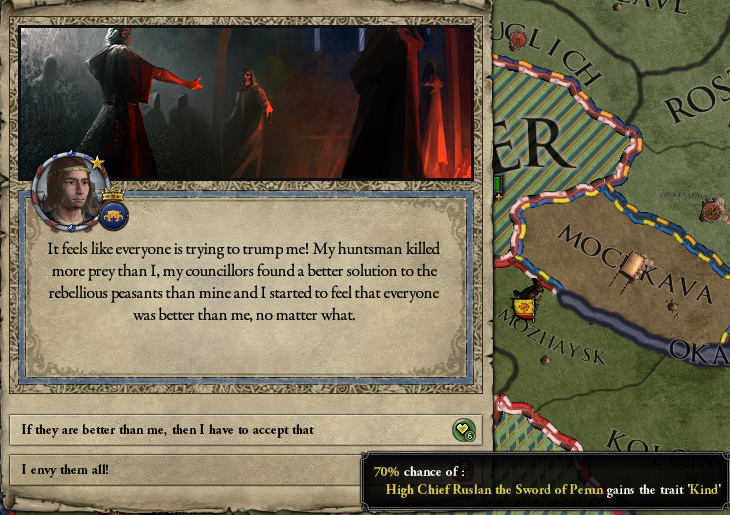 The Warriors of Perun lead the charge at the siege of Bryansk, storming the walls and taking the city. But Feodor doesn't stop their and orders the Warriors and the Ilmenians next to lay siege to the temple of Pochep, which is more of a traditional siege, instead of the frenzied storming of the walls that Bryansk was. Finally, with their cities and temples plundered and burned, the Severians surrender. Tver is made part of Ilmen and Ruslan returns to Novgorod, a hero; the people begin to call him "Mech Peruna," or the Sword of Perun.    The reformed faith is on the rise in Ilmen and with it comes other reforms and changes, further strengthening the chiefdom and its people, all at the cost of some of their traditions and beliefs. One time will tell if this is a net positive, or a horrible misstep by Ruslan and the veche.
|
|
|
|
Chapter 18: Turmoil The Severian War has drained the coffers of the chiefdom, leaving it broke; thankfully the veche remembers the time of Briachislav Bezumnyy and is fully able to continue running the realm. Still, the debt comes at a bad time, as Suomenusko heathens begin raiding Ilmen, taking advantage of the chiefdom's weakened state. The Warriors of Perun do what they can to defend Ilmen, but the chiefdom is too vast and the Suomensko raiders too numerous.  More bad news reaches Ruslan and the veche at the start of 864: Norse raiders have increased their raids on Alban and, as a result, more and more Ilmenian merchant ships have been taken or destroyed. Ilmen absolutely needs another trade partner outside of the civil war prone Byzantines, so a small loan is taken from the merchants of Novgorod to buy new ships and supplies. The chiefdom is spiraling into debt.  Ruslan also takes the time to listen to the problems of the peasants and in May a delegation of priests and farmers from Kurzeme arrives in Novgorod with a bound woman, demanding that Ruslan pass judgement on her for the crime of witchcraft. After interrogating the woman, Ruslan realizes that the young woman was simply teaching the Slavic faith to some Romuva peasants, but replacing the Slavic gods' names with those of the Romuva deities. While its borderline heretical, Ruslan sees the value of incorporating local traditions and deities into the new rites, so he dismisses the priests and peasants and invites the woman to stay in Novgorod at his expense to discuss her techniques.  Trade with the Byzantines continues to pay dividends, if only because of the constant flow of technology and new thought that reaches Novgorod, though this time its something more spiritual that the traders bring with them: they've brought back boxes and boxes of Greek bibles and scriptures, at the request of the priests of Novgorod, who are looking for useful traditions and rites to incorporate into the Slavic faith, in an effort to entice the Greeks and other Orthodox practitioners to convert. The Polish priests that remain in the city loudly denounce the Ilmenian priests, but Ruslan and the veche ignore their squawking.  A few the more hawkish and zealous members of the veche approach Ruslan and ask for his support in securing funds to build a statue of him in Novgorod, to commemorate his victory over the Severians. Ruslan flatly refuses them his backing, pointing out that to do so the realm would have to raise taxes and take out another loan; without his support, the proposal dies.  The Estonians of Ingryia accept new rites and completely abandon their old Suomenusko faith and, for the first time since the city and surrounding country were made a part of Ilmen, the Estonians are peaceful. Apparently sharing a common religion can go a long way to making them feel part of the chiefdom.  At the start of 865, the veche issues a proclamation, declaring that all wars against vassal chiefs must be put to an end for a period of two years. The drafter of this proclamation, Chief Illiya of Uglich, has been beset by numerous other chiefs and, using several favors owed to him by powerful members of the veche, has been able to save his chiefdom from annexation by his more powerful neighbors. Though the proclamation has no legal precedent behind it, Ruslan promises to back it with all the men at his disposal, making its questionable legality a moot point.  The few Ilmenian merchants that bother to trade with the Muslims of the Middle East bring news that there's been some sort of upheaval within their religion and that there are now two Muslims caliphs, each claiming to be the real head of the religion. Ruslan and the veche make a note of the affected areas and advise merchants travelling there to be careful.  One of Ruslan's vassals approaches him to discuss finding some land for non-inheriting sons and Ruslan decides to sell him the city of Kalevan for a hefty price. This immediately solves Ilmen's debt and gives the chiefdom a bit of a surplus of gold.  With the chiefdom back in the black, Ruslan approaches the veche for a declaration of holy war against the chief of Memel; Memel he argues is excellent placed for Ilmenian merchants and would greatly reduce the cost of the Alban trade route. Most of the veche sides with Ruslan, but a significant minority is worried that the Romuva chiefdom of Prussia will intervene on the side of the Memel; the Prussians, despite a significantly smaller force, was able to defeat the Severians and their chief has sworn to destroy the Slavic church. Despite these misgivings, war is declared in May of 865.  The chief of Memel storms Zemlia and takes the city, but Ruslan isn't particularly worried and he reasons that if he wants to waste his men forcing his way into the city, it'll make his job of taking Memel easier.  While Ruslan prepares for war, the veche spends a small amount to once again improve the city's practice range; archers proved to be useful during the Severian War and it would be stupid not encourage more men to take up the practice of using a bow.  The Ilmenians clash with Prussian army at Zemlia in Novmember and it quickly becomes apparent that the Prussians are absolutely insane in the heat of battle; after a few too many near misses, Ruslan calls for a retreat, despite the fact the Ilmenians still outnumber the Prussians. Ruslan is badly shaken by the experience and returns to Novgorod to recover, leaving his commanders to fight the war.   Still badly shaken, Ruslan snaps at his wife when she dares to suggest that perhaps Dennitsa shouldn't be allowed to just walk all over the dining table. He later apologizes to her, but the damage is done and its weeks before she even starts talking to him again.  With the war for Memel effectively stalemated, Ruslan and the veche take whatever good news they can; when the Estonians of Narva also see the light of the Slavic church and join their Ingryian brothers, they can at least sigh in relief that maybe days of the Estonians constantly rebelling are finally over.  In August of 866, the Ilmenian commanders once again try to break the Prussians holding Zemlia, but they are once again repulsed; they try once again in March of 867 but have no such luck. Its quickly becoming apparent that this war was foolish and that the gods do not favor Ruslan.   The Prussians don't remain at Zemlia after defeating the Ilmenians again in 867; instead they march to Riga and seize the temple, looting it before burning it to the ground. Zemgale falls shortly after and Ruslan and the veche both know that the war is lost. Peace is made in May of 867 at a hefty cost to the Ilmenians: the chiefdom is once again in serious debt.    Ruslan has just the way to relieve some of the debt, though: the chief of Rostov has embraced the old rites, giving Ruslan and the veche the right to seize his lands and gold. Chief Rodislav strongly disagrees with this choice and declares himself independent of Ilmen.   When news of Rodislav's rebellion spreads and soon a thousand zealous men arrive in Novgorod, looking for a chance to enforce the chiefdom's new religion. Ruslan is more than happy to take them up on their offer of support.  During the early days of the rebellion, the proposal to build a statue to commemorate the Severian War is once again brought up by the same members as the veche as before. Ruslan turns them down again, after a rather loud shouting match between him and their leader; he makes it clear that there's a war on and that it should be their only focus.  The rebels take the Belo Ozero in December, but the loyalist army doesn't even give them time to break camp and move before they engage them in battle. The main rebel army is broken nearly a week after seizing Belo Ozero and at the start of the new year, Belo Ozero is in loyalist hands once again.    With his army badly bloodied, Rodislav retreats to his lands, but Ruslan and the loyalist army is on his tail and manages to pin them down at Pereyaslavl Zalessky. During the battle, a young noble distinguishes himself when he saves Ruslan's life with a timely sword strike; he is immediately made part of Ruslan's personal entourage.   Pereyaslavl Zalessky and Rostov fall shortly after the Battle of Pereyaslavl Zalessky and Rodislav sees the writing on the wall; as Rostov falls, he sends word that he would be interested in a white peace between himself and Ruslan. Ruslan turns him away.  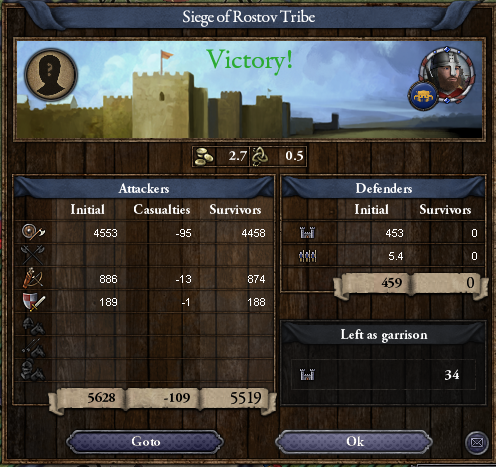  The rebels try to take back Pereyaslavl Zalessky in June of 868, but the loyalists easily defeat them; during the battle, Ruslan is towards the back, issuing orders and leading from the back, when a few rebels manage to slip past and attack Ruslan. Next thing Ruslan knows, he's covered in blood, the ceremonial axe of his office covered with blood and his attackers either dead or wounded and it is as if some otherworldly force protected him from harm. That night, Ruslan dedicates himself to Perun to show his thanks.   In Novgorod, the plans for the statue to commemorate the Severian War start making the rounds in the veche again, but with the rebellion and debt still an ongoing concern, it doesn't even get past preliminary discussions before being tabled again.  Toropets falls in August of 868, leaving just Zemgale as the final rebel hold out; the writing is on the wall and Rodislav knows. Peace is made not long after the fall of Toropets and Rodislav and his co-conspirators are arrested and thrown into jail.   The rebels are stripped of all their titles before being banished from the realm; finally, the long civil war is over and the chiefdom's wounds can finally heal. 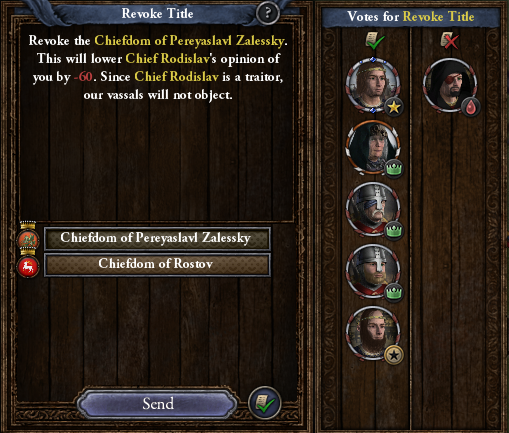    With the war over and the rebels punished, Ruslan returns to Novgorod, only to be greeted with terrible news: Dennitsa has died. Ruslan buries her in the garden created by Rodislav II Dobro and dedicates a small statue to Dennitsa.  In December, more bad news reaches Ruslan: one of his distant cousins, from a bastard branch of the family, has decided to bring the old rites back to the chiefdom at the point of a spear. Ruslan isn't sure the chiefdom can take another long, drawn out war, but he makes sure to prepare for the worst.  The Greeks continue to be a source of innovation as traders from Constantinople bring back books on tactics and strategy. Ruslan, with the backing of the veche, implements the teaching of them immeidately; the decision quickly pays off, as one of the chiefdom's commanders begins training his troops in the use of them and, in the process, improves his own skills at war.   Then, in 870, the Estonians of Saaremma rise in revolt; during the island's occupation by the Norse, the majority of its people had adopted Norse customs and traditions, including the Norse religion. Almost at the same time, the pretender Mstislav declares his war for control of the chiefdom.   The chiefdom is in turmoil and running on fumes; it is the hope of the veche that Ruslan can defeat the pretender and finally secure Ilmen for himself and the Slavic church, earning the realm much needed and deserved peace to recover from the last several years. Hopefully, that's just what Ruslan and Ilmen will get.
|
|
|
|
Chapter 19: Khram Yarilo Ruslan decides to deal with the Estonians first, engaging them as they cross from Saaremma into Kurzeme; during the battle a man named Iziaslav proves himself to be an incredibly adept leader and fighter have the kills nearly twenty Estonians. Ruslan takes the man under his wing, with the intent of promoting him to commander when he returns to Novgorod. The Estonians are defeated and their leader sent back to Novgorod in chains, ending the revolt.   While Ruslan was busy with the Estonians, Mstislav and his army took the city of Vilnius with little resistance from the local garrison. This isn't particularly surprising and Ruslan maneuvers his army to catch them as they leave the city. Mstislav's army manages to slip by without the Ilmenians engaging them, but Vilnius is liberated. Still, even without a battle to be fought, Ruslan does manage to pick up some practical skills.    The proposal to create a statue is an eternal piece of legislation; it will always be with the veche, always circulating, but never being passed. At least, that's how its starting to seem.  The pretender and his army are finally pinned down at Toropets and Ruslan continues his policy of leading from the back, taking advantage of a hill to observe the whole battle. His slow, methodical plans win the day for the Ilmenians.   A tribe of Mordvins, paid by Mstislav, raid Pereyaslavl Zalessky. The Ilmenians pursue them back to their homeland and massacre them, taking back any loot they stole from Pereyaslavl Zalessky.   December brings a new request from King Prendota: his first wife has recently passed away and he's looking for a new one; his first pick is one of Ruslan's relatives. Of course, Prendota's choice isn't motivated by love and he's hoping that a marriage into Ruslan's family will lead to a full blown alliance between the two biggest Slavic powers; like Ilmen, Poland has been wracked by instability during the conversion to the new rites, but unlike Ilmen, the kingdom hasn't weathered the change very well. The result has been Prendota arresting anyone who dares challenge him, leading to his new nickname "the Evil." Still, the chance of an alliance with Poland is too good to pass up, especially in these dark times, so the veche approve of the marriage, though they don't move to make the alliance anything more than a non-aggression pact.  The people of Narva bring a woman to Novgorod, claiming she is a witch but, with a little investigation by the veche, they realize that like the case from a few years ago, the woman was simply using local traditions to help preach the Slavic faith. The veche, as Ruslan's acting agents while he's out fighting a war, condemn the peasants and invite the woman to stay in Novgorod, so that they may question her further about her methods and how successful they've been.  Ruslan's ambition grows, as word of the marriage between his relative and Prendota finally reaches him; he realizes that Ilmen is no longer a small chiefdom supported by trade with the distant Greeks, but rather a regional power that has the ability to influence the tribes around it. Ruslan dreams of bringing the chiefdom kicking and screaming into the future. He dreams of uniting all the Slavic tribes of the east.   Increasingly, Novgorod has become a major center of religion for the Slavic church, as priests come from around the realm to study the new rites, as well as offer guidance to the veche and the people of the city. Eager to break some of the Polish control over the church, the veche are more than happy to build a great center of religious learning and thought in Novgorod; the Khram Yarilo, or Temple of Jarilo, created the base for which a distinctly Ilmenian branch of the Slavic church would grow.  Using the Mordvins as a distraction, Mstislav and his army manage to retake Vilnius, before heading towards Zemlia. Ruslan rushes to meet them, not intent on letting them take another Ilmenian city for themselves. Mstislav is captured at the Battle of Zemlia and his war ends soon after, with victory for Ruslan.    With peace finally achieved, Ruslan returns to Novgorod with Mstislav in tow. He then takes his captive to the newly built Khram Yarilo where he prays to the gods for the continued prosperity of Ilmen, before asking the priests there to sacrifice Mstislav in honor of the gods; they are only too happy to oblige their chief. 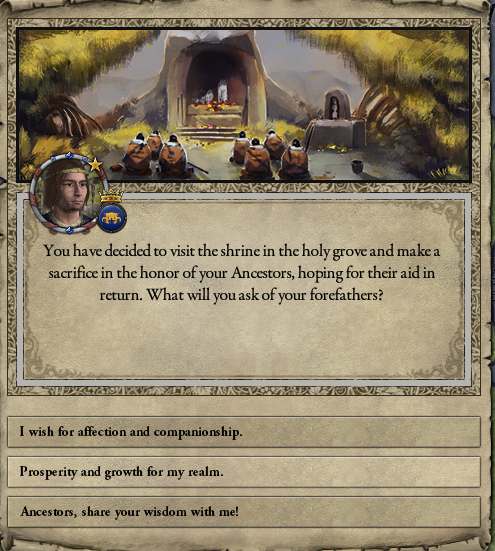   Ruslan also asks the veche to give him permission to give Rostov to his son Vysheslav, which they grant in light of his service to the realm and the veche; their only condition is that Ruslan attend a small feast in his honor and give a speech about the importance of duty to the crown. Ruslan does, much to the delight of the veche, who use the opportunity as a chance to get some much needed gold out of the assembled vassals.    Ruslan receives his wish for peace and prosperity, as for three years Ilmen doesn't suffer a revolt, civil war, or invasion; there's not even a raid by the surrounding tribes. Finally, in February of 874 the chiefdom is out of debt, with a small surplus of gold. The veche uses a small amount of this gold to once again expand Novgorod's archery range.  While the peace and quiet was much needed for the chiefdom to recover, Ruslan has only known war for the last several years and the prospect of uninterrupted fills him with a strange sense of dread and unease, putting him into a deep depression. That's why, in March, Ruslan approaches the veche to ask for their support to try and retake Memel, though this time he makes it clear that it won't be a full holy war.   The chief of Memel, a Lithuanian named Karnak, immediately attacks Riga, defeating the small garrison there, before they lay siege to Zemgale, which falls in August; Riga follows in September.    Ruslan marches to Zemgale intent on fighting Karnak's army, but upon seeing the size of their force, Karnak retreats to Memel. Ruslan retakes Riga and Zemgale, before marching towards Memel; Karnak again retreats, falling back into Prussian territory, leaving Memel for the Ilmenians to take. It appears without Prussian support, Karnak is not much more than a paper tiger.    With Memel under his control, Ruslan makes peace with Karnak and Memel is made part of Ilmen, but with one difference from the usual annexation: Karnak is made part of the city's new veche and the Romuva practitioners are allowed to practice their religion until Ruslan dies; Karnak and several Romuva lords are also given preferential trade rights, on top of everything else granted to them. The hope is that the preferential treatment, combined with Ilmenian traders and settlers, will convince them to peacefully convert to the Slavic church. One of Ruslan's relatives is then made the chief of Memel, though he is little more than a figurehead, as Karnak and the new Romuva merchants control most of the city.   In July of 875, Prendota offers one of his sister's hands in marriage to Ruslan, looking to further cement the relationship between the two chiefdoms. Ruslan is only too happy to marry into Prendota's family, mostly because Samboja, Prendota's sister, comes with an extremely nice dowry, which helps to relieve some of the debt incurred during the Second Memel War.   The raiders of Mochkava have long been a thorn in Ilmen's side and in December the veche gives Ruslan the authorization to hire a small band of adventurers to "deal with" the Mordvin chiefdom. As it turns out, the adventurers raze Mochkava to the ground, before slaughtering every man, woman, and child in the city, before settling into the remains of the city, giving it a more proper Ilmenian name: Moskva. The men of Moskva then pledge their loyalty to Ruslan, bringing the city under Ilmenian control.   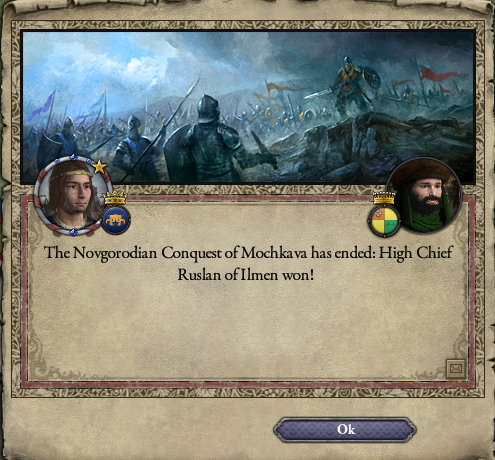 Prendota, the creator of the reformed Slavic faith, dies in July of 876 and is replaced by one of his relatives, a man by the name of the Stoigniew. Stoginiew's first act is to solidify the power of the king along the lines of the French and Greek empires; Poland has embraced feudalism.  In October the veche approves the overhaul of the capital's shipping docks, expanding them to accommodate bigger and more ships. 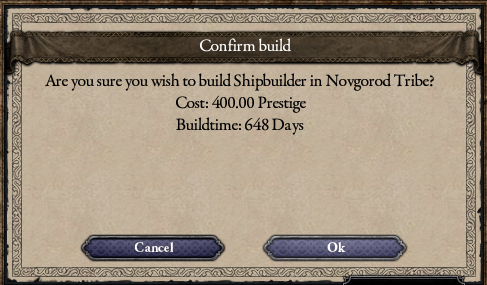 Finally, in June of 877, the proposal to build a memorial to the Severian War makes the rounds again in the veche, but this time Ruslan throws his support behind it, finally allowing it to pass; the construction of the memorial starts in early July.  Prussian raiders are repelled from Zemlia in September, a reminder that there are still those who deny the light of the Slavic faith.  The monument to the Severian War is finally completed in 878, after years of being stuck in limbo in the veche. It paints Ruslan in an extremely positive light and his legend as the Sword of Perun grows.  The years of peace have allowed Ilmen to rebuild and recover and in August of 878 the chiefdom's coffers hold enough gold to comfortably support another war. This time Ruslan sets his sights on the Severian chiefdom of Ryazan, ruled by Briachislav the Chaste, who refuses to accept the Slavic church. Ruslan hopes to seize the whole area for Ilmen, but the veche is understandably nervous, as the last holy war resulted in several years of debt and turmoil. Still, Ruslan is confident and able to convince enough of the veche to support the war.  Ryazan lays open for the taking and, as one of the last major Old Slavic chiefdoms, its defeat would signal the end of the old rites. Ruslan plans on proving he deserves to be called the Sword of Perun. THE LESBIATHAN fucked around with this message at 20:21 on Nov 25, 2017 |
|
|
|
Brutus Salad posted:So how long did it take him to get that nickname? Since I assume you have to do something cool to get it. He had it when he became king; I believe he purged a bunch of Old Slavic heretic from southern Poland, where his chiefdom was.
|
|
|
|
Chapter 20: Tysyatsky The Ilmenian army starts off the war by laying siege to the Ryazan city of Kolomna and during the siege Iziaslav, the man Ruslan discovered during the last Estonian revolt, takes the chance to better his understanding of siege craft.   Back in Novgorod, the veche and the priests of Khram Yarilo work together to develop new farming techniques; the hope is that the priests of Jarilo will be able to use their link with the god to gain some sort of inspiration or insight.  The Ilmenians engage the Ryazan army at Moskva, forcing the heretics to retreat back into their homeland. With the Ryazans retreating in disarray, Ruslan puts the city of Solotcha under siege. During the siege, one of his commanders, a man by the name of Yevstafiy, improves his martial ability.   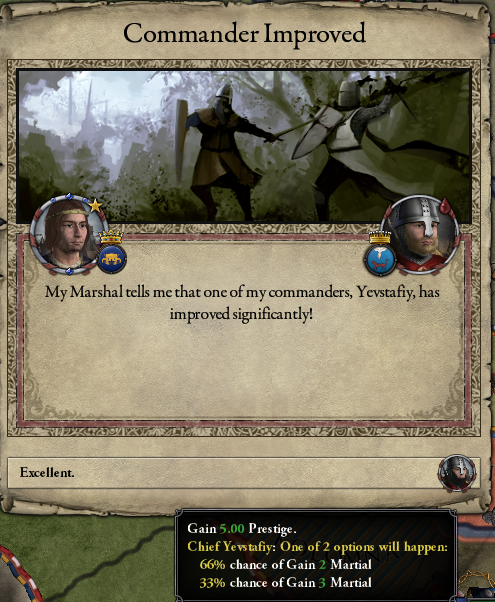 Peace is made in April of 879 and Ryazan is made part of the chiefdom; Ryazan's defeat is a death knell for the old faith, as the heretics have no allies left to call.   Ryazan, as the last major stronghold of the old rites, is full of heretics who shun the Slavic church; the veche appoints the priestess Viacheslava as the leader of the cities of Ryazan and Pronsk, while Kolomna is given to commander Iziaslav, for his outstanding performance during the last few wars.    Ilmen's recent expansion at the expense of its neighbors hasn't gone unnoticed by the Suomenusko tribes and, in 879 they form a mutual defense pact against Ilmen.  Ruslan returns to Novgorod in June and declares a celebration in honor of Jarilo for blessing the chiefdom with a victory over the heretics of Ryazan.  Ruslan uses the Jarilo festival as an excuse to talk to some of his more heretical vassals; with the defeat of the last major old Slavic chiefdom, they wisely choose to embrace the reformed faith.    The celebration begins with a small hunt where Ruslan meets one of his old commanders, now a landed chief since his father passed away. The two men get to talking and reminiscing about the wars they participated in; by the end of the night the two are the best of friends.  The festivities start the next day, with the picking of one of Ruslan's vassals to represent Jarilo; Ruslan's cousin Rodislav is chosen and the assembled chiefs shower him in gifts and appreciation. Once the proper observations are made to honor Jarilo and his representative, the feast starts.    While the feast itself is going alright and everyone is enjoying themselves, until Ruslan's uncle Rodislav manages to vomit all over the priestess of Ryazan. Shamed and humiliated, Ruslan apologizes for his oafish uncle; thankfully Viacheslava accepts his apology. Despite the disturbance, when the assembled chiefs leave the next day, they all agree that the Jarilo festival was truly one to remember.   Infighting and disagreements about how best to prevent Ilmenian expansionism causes the defensive pact to fall apart in December of 879. 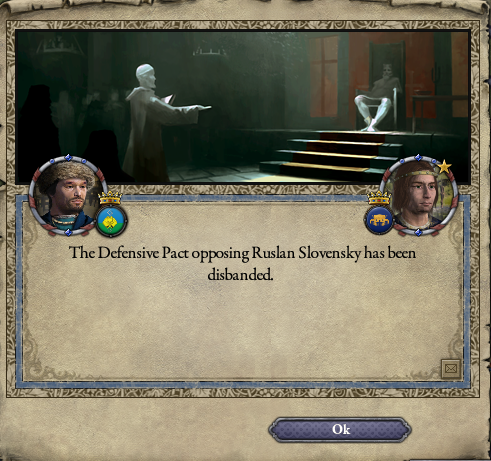 In February of 881, the high chief of Moravia asks for Ruslan's permission to marry his heir to Ruslan's daughter Malusha; Ruslan agrees, eager to again some allies within Poland, should the two Slavic powers ever come to blows.  Ruslan's chief physician, with the help of the priests of Khram Yarilo, publishes a small book about medical science. Most of it is plagiarized from Greek and Albani sources, but there are a few new ideas contained within it; while it doesn't gain much traction outside of the chiefdom, in the Slavic world it becomes notable as one of the first serious medical texts of the time.  The rest of 881 passes quietly and, when the veche is reassembled in January after a short break, Ruslan has an announcement. First, he has declared himself the chief of all Estonians and second he declares himself tysyatsky of Ilmenia. Ruslan's declaration sends the veche into a frenzy of activity, since the second declaration now officially puts Ruslan on the level of the Polish kings, at least in terms of power and administration. There's one key difference to the Polish kings, though: Ruslan has declared himself tysyatsky, not king. While the difference may appear slight at first blush (a tysyatsky is simply a chief with an extremely large army under his command, typically at least one thousand men), by declaring himself tysyatsky, he's subtly said that he's a servant of the veche, specifically the military arm of the veche. By claiming the title of Tysyatsky of Ilmenia, he's effectively made himself a member of the veche, on their level, but not above it. But Ruslan's dream of ruling the largest Slavic realm in the east has finally come true.  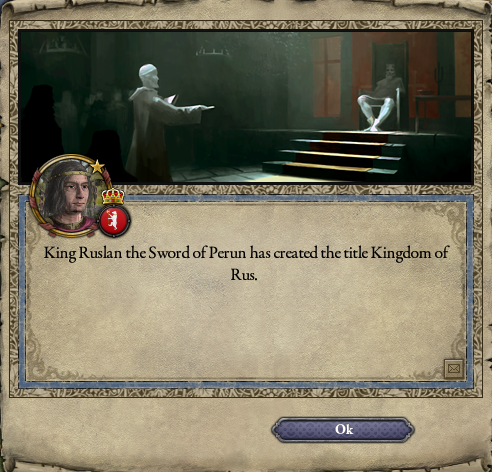 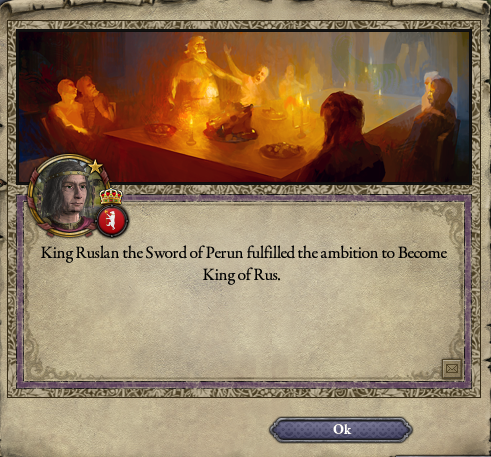 Ruslan isn't the only one with big news, as Chief Rodislav of Toropets declares himself High Chief of Belo Ozero; while Ruslan and the veche have been focusing on expanding Ilmen through force of arms, Rodislav was slowly conquering other chiefdoms within Ilmen, until he controlled most of Estonia and the northern chiefdoms. Ruslan and the veche can't stand to have such a dangerously big threat within the chiefdom, even if right now Rodislav is friendly and willing to cooperate with Ruslan and the veche. So, with veche backing, Ruslan demands that Rodislav turn over his title as High Chief of Belo Ozero; in doing so, Rodislav will also give up vassalage over any chief under his control, though he'll still get to keep any lands he personally controls. Surprisingly, Rodislav agrees to the demand.    In return for their support in bringing the self styled High Chief Rodislav to heel, the veche asks that Ruslan delegate some of his power to regional chiefs, so Ruslan raises Chief Illiya of Kalevan to the Chief of All Estonians. Ruslan also grants the city of Kurzeme to his son Terentiy as part of the deal. 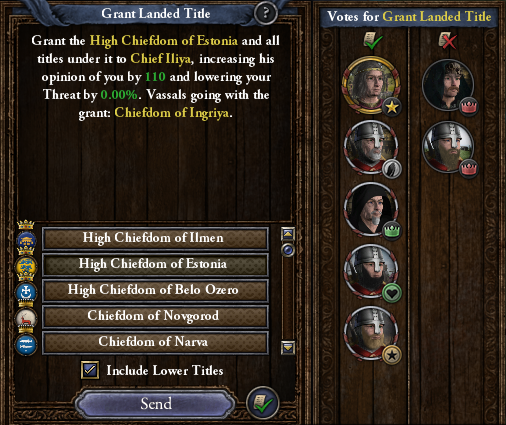  Ruslan and the veche continue to delegate power as, at the start of 883, Chief Briachislav is made High Chief of Belo Ozero and tasked with defending the northeast from Suomenusko raiders.  Back in Novgorod, Ruslan is having problems with a woman, claiming to have had an affair with him. Ruslan has been so busy with war and running the chiefdom, he hasn't had time to have an affair, but he's worried that such rumors will distract from the important work of running Ilmenia. While hunting with his friend Mitrofan, he brings up his problems with the woman. Mitrofan is sympathetic and offers to help, if the price is right. Ruslan is disgusted by the greed of his supposed friend and leaves in a huff; Ruslan then proceeds to break all contact with Mitrofan, ending the friendship.    In 883, Ruslan proposes a war against the Khazars, who have recently conquered the Krivichi, a tribe composed of Ilmenians and Severians; he hopes to liberate the Ilmenians of Vitebsk and, at the same time, gain control over the city's trade ports.   The Khazars send horse mounted raiders into Ryazan, defeating the garrison at Moskva and Pereyaslavl Zalessky. Strangely, they decline to lay siege to the towns, instead contenting themselves with raiding the countryside and burning small farms to the ground. 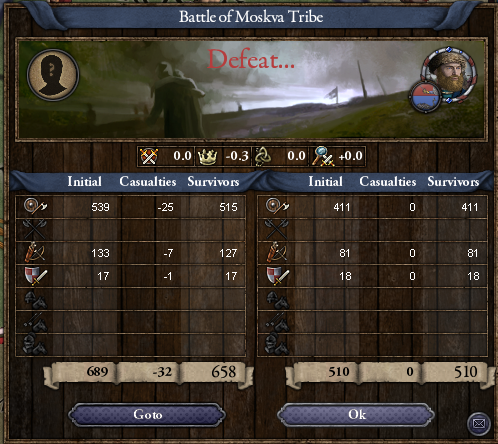  The Ilmenian army shows the Khazars how to properly wage war and Vitebsk is seized in May of 884. Almost in response to the loss of Vitebsk, the Khazars take Pronsk. Instead of moving to take back Pronsk, as the Khazars probably hoped he would, Ruslan takes Polotsk and Orsha, securing the area.  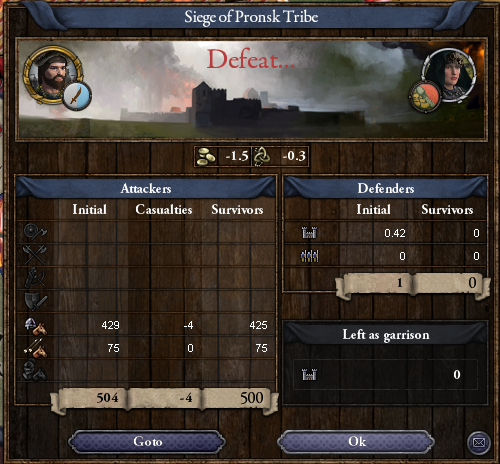   Next the Ilmenians head to Vyazma and take it and the temple of Dukhov. So far, with the exception of Pronsk and a few early battles, the Khazars have been remarkably quiet.  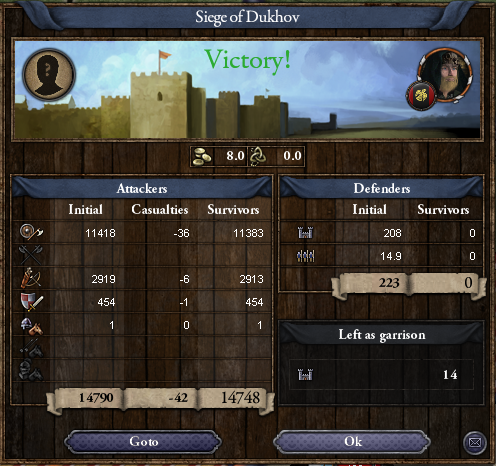 Ruslan finally manages to pin down a Khazar army at Orsha and defeat them; the Khazar army was incredibly small and nothing compared to the rumors of vast horse mounted armies. The Khazars try to break the Ilmenians at Orsha again in 885, but again have no luck in taking the city from the numerical superior Ilmenians.   Finally, the Ilmenians engage a large Khazar force at Kolomna; during it, Ruslan meets the Khazar khagan on the battlefield and, after a short exchange, the khagan runs off with minor injuries. With their leader retreating, the army follows and the Ilmenians carry the day, largely in part thanks to Ruslan.   Completely humiliated, the Khazar khagan surrenders on June of 885 and Vitebsk is secured for the chiefdom.  Ruslan doesn't rest long and just a few days later he's marching on the remnants of the Ryazan chiefdom, now centered in the city of Mozhaysk. The city itself falls without any resistance in December of the same year, and by the start of the new year, the city is in Ilmenian hands and peace reigns once again.    In 886, Ruslan declares himself Chief of the Livonians, usurping the title from the last living descendant of the old chiefs that ruled the area. The title is given to one of Ruslan's relatives.   The old Khazar khagan dies in 887 and Ruslan is quick to jump on the khaganate once again, this time to seize Polotsk. Once word of the war spreads, a large group of warriors arrives in Novgorod, mostly made up of Krivichi nobles and farmers who lost their land when the Khazars took over the chiefdom.   Polotsk falls in September without too much fight; this is in large part thanks to the Krivichi who accompanied the Ilmenian army. Ruslan then swings towards Orsha, where they engage and obliterate a small Khazar force. Orsha falls in October.    The war against the Khazars inspires military innovation, mostly in siege craft, but also ways to adapt the Khazar hit-and-run tactics.  The Ilmenian army engages the main Khazar army at Kolomna, where they defeat the smaller Khazar army. With the Khazars defeated, Ruslan orders the Ilmenians to Bryansk, another Severian city taken by the Khazars. Bryansk falls without issue and the temple of Pochep follows shortly after. It would appear that the main Khazar force will no longer be an issue, following their loss at Kolomna.    Ruslan then marches his army to the Khazar capital of Pereyaslavl, which used to be part of a larger Severian realm. The city falls in September of 888 and with it, peace is not far behind. Polotsk is turned over to Ilmenia and Ruslan returns to Novgorod once again a hero. 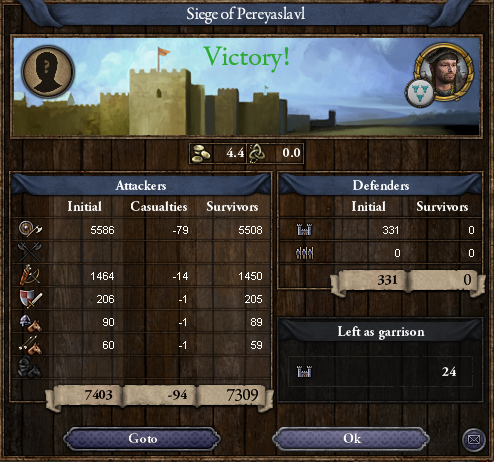  In March of 889, the Old Slavic heretics of Ryazan rise up, hoping to retake the chiefdom and establish an Old Slavic state. Ruslan doesn't intend to allow that to happen and his response is swift and brutal and the rebels are defeated two months later in June.    To celebrate, Ruslan holds a Jarilo festival in the early days of July and Chief Yevstafiy is chosen to represent Jarilo this year. With Jarilo chosen, he is made the guest of honor at the feast in honor of Jarilo.    Just like the last Jarilo festival, things don't go so smoothly, as High Chief Illiya, chief of the Estonians, is caught having sex with a servant girl in the middle of the feast. While everyone can appreciate the lust that the spring god Jarilo can inspire, there have to be limits to what can be done in public. Still, despite Illiya's actions, everyone has a good time.   Tysyatsky Ruslan dies on August 11, 890 in his bed. He passes peacefully and, after a proper mourning period, Ruslan's son Vysheslav is elected Tysyatsky of Ilmenia. Ruslan's reign marks the end of the Tribal Period of Ilmenian history and the start of the Tysyatsky Period.  History remembers Ruslan as Tysyatsky Ruslan Pervyy Mech, often translated as Ruslan the First Sword.
|
|
|
|
Josef bugman posted:How large is the realm at the moment? It must be massive by this point. I'll be doing another state of the world in one or two updates (I'm aiming for one every 50 years, at least in CK2), but by this point I was giving Poland a run for their money, in terms of sheer size.
|
|
|
|

|
| # ¿ May 10, 2024 21:54 |
|
Chapter 21: The Tyrant Vysheslav, like his father Ruslan, is a patient humble man, with a zeal for the Slavic faith that most men aspire to; this zealousness doesn't exactly mesh with some of his darker desires and its fairly common knowledge that he lusts after men. In reaction to these rumors, Vysheslav has sacrificed an eye and an arm to the gods, to prove that he is a pious man. Of course, it probably doesn't help that his dwarf wife prefers the company of women and the two only make appearances together at official events.  Now that he's tysyatsky, Vysheslav is expected to keep a stable of concubines to help continue the family line and so, despite his personal distaste for the practice, he takes some concubines, most of who are prisoners of Ilmenia, guaranteeing that they'll hate him and want nothing to do with him, while still, on paper, fulfilling his familial obligations.   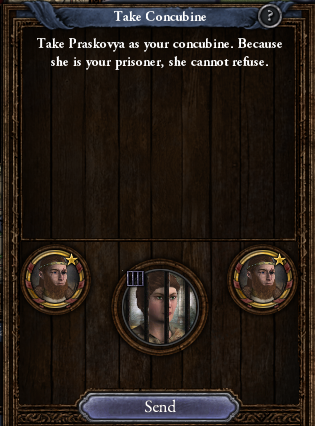 Still, despite Vysheslav's best efforts to interact with his wife and concubines as little as possible, he does manage to conceive a second son with his wife Veleslava, which helps quash some of the rumors surrounding him.  In February of 891, Vysheslav finally catches wind of who started all these rumors about his manhood: its his kinsman, Chief Ruslan of Ladoga. Vysheslav bribes several members of the veche to gain their support and then sends his marshal out to arrest Ruslan, on some trumped up charges of not paying the proper church tithe. Ruslan doesn't resist, confident that his supporters in the veche will get him out, but their voices are in the minority.   As summer starts, a small diplomatic mission from the Kingdom of Bulgaria, containing Queen Vladislava, arrives in Novgorod, seeking to speak with "King Ruslan the Great." They are disappointed to find that Ruslan has passed away, but they are more than happy to meet with Vysheslav and the veche (who are both quick to correct them that there is no king of Ilmenia). As it turns out, the Bulgarians are interested in establishing a trade route with their Slavic brothers to the north; Pannonia and the Balkans have been in almost a constant state of warfare, as the Avars try to reclaim their lost land from the Slavs, making it hard for Bulgaria to trade with their normal partners. After a short discussion, the veche agrees to accept trade with Bulgaria and soon Bulgarians can be seen in Novgorod arguing with the Greek, Ilmenian, and Albani traders. Rostov, the first stop for Bulgarian traders, prospers from the new route.    Vysheslav puts some of the money gained from the new trade route to building a statue of his father to adorn the veche's meeting hall, perhaps as a reminder that he's related to the man the veche owes so much to.  Vysheslav also continues to use fear to control his vassals; when his spymaster finds some incriminating information of one of his vassals, he blackmails the man into staying loyal to him, but not to the veche. In fact, he uses this blackmail to control the chief's vote in the veche, giving him a slight majority.   The Norse raiders continue to harass the Ilmenia's trade with island of Alban, necessitating a greater investment in more ships and supplies. Its becoming clear that something must be done about these savages, and soon.  Vysheslav's statue of his father is finished in 892 and placed in the veche hall, intentionally positioned to watch over the assembled veche members; everyone agrees that its slightly creepy.  In March of 893, one of Ilmenia's nomadic neighbors approaches Vysheslav to ask for one of Vysheslav's relatives for their khan's wife. Vysheslav begins to turn the offer down, saying that he has no interest in marrying into the Tengri heathens, but the messenger swears that Khan Bashtwa has accepted the Slavic gods into his heart. Vysheslav can hardly believe it, but the man quickly starts reciting scripture and telling the story of how Bashtwa converted after seeing Perun's axe in his dreams. Convinced, Vysheslav accepts the proposal, happy that the Slavic church has such a strong appeal with the nomadic tribes to the east.   August brings new courtly scandal, as a fight between Vysheslav and his wife ends with the two sleeping in separate chambers. The rumors that plagued Vysheslav's early years as tysyatsky are back.  Vysheslav is eager to escape these rumors and in September he begins planning another trade mission to Alban in an effort to set up an alternative trade route to the island to make it harder for the Norse to raid Ilmenian trade ships.  The veche approves of the trade mission and provides a massive trade ship; their only condition is that Vysheslav must bring with him a contingent of Slavic priests, partly so they can study the Albani religion, but also to try and spread the Slavic faith to the island. Vysheslav is only too happy to have the priests accompany him and he is often seen debating theology with them on the deck of the ship. The Khram Yarilo also pays for the priests' passage, easing the realm's burden for financing the trade mission.   Vysheslav and his men set off on the 25th of September, hopeful that their mission will result in new wealth for Ilmenia.  They arrive in Alban in early November and are greeted by several armed men who assume the Ilmenians are Norse raiders. Using a translator fluent in Albani, Vysheslav explains that their mission and who they are, but, much to his surprise, the soldiers appear to not understand Albani, despite being natives to the island. The Ilmenians are even more surprised when the men start speaking a harsh language, reminiscent of that of the Norse raiders (at least to their ears). Fearful that they've actually encountered Norse raiders, the Ilmenian guards arm themselves and prepare to fight. After a few tense moments, one of the foreign soldiers speaks up in what sounds like broken Albani. The Ilmenian translator, with a lot of effort, makes himself understood, though the man claims not to speak Albani but Welsh and that the Ilmenians are speaking Cornish. The trade party is then escorted to the local priest (called an archbishop by the not quite Norse), who, after some explanation, welcomes the Ilmenians to the city of York. The priest explains that the Ilmenians aren't completely unknown this far north of Angliya (the Ilmenians are extremely confused, apparently Alban has not one but two names?) and that Vysheslav and his men are more than welcome to discuss trade with the priest, who rules the city and the surrounding countryside. Vysheslav, eager to get negotiations started, offers up thirty of his best men to the priest Gamall as a gift; Gamall is extremely impressed with this show of wealth and generosity.  Priest Gamall holds a small feast to celebrate the arrival of the Ilmenians, during which Vysheslav's steward embarrasses himself and Vysheslav for his poor table manners. After Vysheslav shouts at the man, his behavior and manners improve.  The priests from Khram Yarilo carry out their mission of learning about the Albani faith, as well as attempting to spread the Slavic faith to the island; the priests of York, as well as Gamall, are not too happy with the Slavic priests for attempting to convert the citizens of York, but Vysheslav supports the rights of his priests to preach and offers to take some Albani priests back to Novgorod, just as Rodislav II Dobro did. Gamall declines to take him up on his offer.  Despite this disagreement, Gamall and Vysheslav are able to find enough common ground to strike a deal between their two realms and, at the start of December, the Ilmenians sail back to Novgorod, carrying the first load of goods.   When the trade mission arrives back in Novgorod in February of 894, Vysheslav's steward asks for a cut of the profits from the first trade mission, claiming that the whole mission was his idea; Vysheslav points out that all the man did was his job and, given how he jeopardized the whole thing with his bad manners, he really doesn't deserve anything besides the praise of the veche. The steward is not amused.  A month later, Vysheslav finally uses his slight majority in the veche to get them to back a war against the High Chiefdom of Murom, a Mordvin chiefdom that holds an important city along the Oka River; the Mordvins of Murom have been raiding Bulgarian trade ships and Vysheslav is sick and tired of it and his solution is simple: the annexation of Murom for Ilmenia.  The Chief of Tver is a vocal opponent of Vysheslav's and his manipulation of the veche through nefarious means and he uses his sway in the veche to throw up a lot of resistance to the war against Murom, mostly to mess with Vysheslav. Vysheslav uses his connections to arrest Chief Mstislav, silencing yet another of his opponents.   The High Chief of Murom sends a small force to take Kolomna, mostly as a token of resistance against the far bigger Ilmenia, and the Ilmenian army easily defeats them. Vysheslav uses this low stakes battle to test out some new tactics inspired by the Khazars and his tactical ability grows as a result.   Vysheslav continues to grow his power in the veche, using a combination of blackmail and legalism to maintain his control. Whispers begin that Vysheslav will end the veche once and for all, declaring the position of tysyatsky hereditary.   The city of Murom falls in August with little resistance and peace is made not long afterwards; Murom is made a part of Ilmenia and trade with the Bulgarians continues uninterrupted.   Vysheslav returns to Novgorod and continues his campaign of imprisoning political enemies; this time the Chief of Yaroslavl is his target, as Vysheslav claims the man refused to send troops to aid during the war to take Murom. The veche, both through bribery and threats, agrees to back the arrest. Chief Nikita of Yaroslavl, seeing that he has no support in the veche, agrees to pay a small sum of gold to Vysheslav by way of apology for not supplying troops for the Murom conflict.  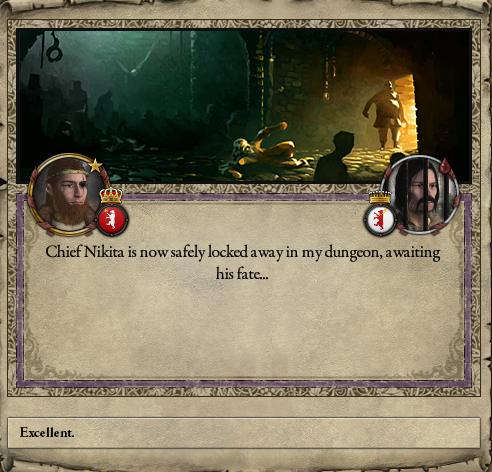  Vysheslav's tyranny hasn't gone completely unnoticed, particularly by the peasants, who feel that their local veches are having less and less influence and say in the Novgorodian veche. This comes to a head in September of 895, when the Mordvin of Kolomna rise up in revolt, citing increased taxation and less say in the Novgorodian veche as their major grievances.  The Ilmenian army finally engages the rebels at Kolomna at the start of January, in the dead of winter. Vysheslav is quick to use the cold weather to his advantage and he becomes known for getting the most out of his troops during winter. The battle ends in an Ilmenian victory and the rebellion's leader joins Vysheslav's political enemies in the dungeons of Novgorod.    Perhaps to appease his detractors, Vysheslav creates the High Chiefdom of Ryazan and awards it to Priestess Viacheslava, making her the Archpriestess of Ryazan.   Vysheslav also makes time for his wife, naming her both the court dwarf and court jester. She is, unsurprisingly, not amused by her husband's antics.   A year after taking Murom from the Mordvins, Vysheslav returns to take the cities of Vladimir and Obran Osh from the Mordvins; with the support of the Archpriestess of Ryazan, Vysheslav is able to ignore most of the veche and declares a holy war for the two cities.  The Ilmenians quickly take Vladimir from the Mordvins and Vysheslav is confident that the war will soon be over. So confident of his abilities and the abilities of the Ilmenian army, he attacks the Mordvins at Obran Osh, despite them significantly outnumbering him and his men. Vysheslav's confident costs him, as he is maimed by a Mordvin during the battle, causing him to fall off his horse and badly breaking several of his bones. With their tysyatsky defeated, the Ilmenians retreat.     Vysheslav is rushed back to Novgorod, as his commanders are sure the he does not have much time left in this world and, with their tysyatsky out of their hair, they are able to defeat the defenders of Obran Osh and take it for Ilmenia.   Vysheslav never makes it back to Novgorod, nor does he ever learn of Ilmenia's victory over the Mordvins of Obran Osh; instead, he dies in transit to Novgorod. The official cause of death noted in the veche records is due to his wounds, but several people note that Vysheslav's head had somehow become separated from his body sometime between the First Battle of Obran Osh and his return to Novgorod; the veche doesn't bother to look into these rumors and instead elect one of Vysheslav's prisoners, Mstislav of Tver, as the new tysyatsky.  History remembers Vysheslav as Tysyatsky Vysheslav Tiran, often translated as Vysheslav the Tyrant.
|
|
|



